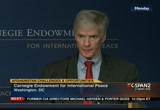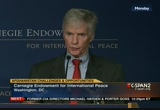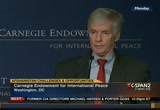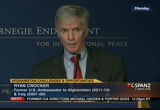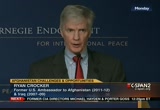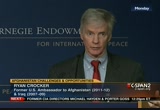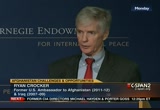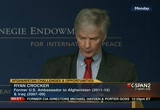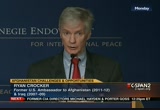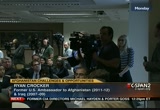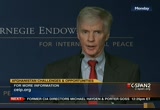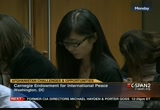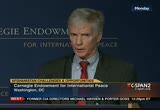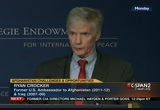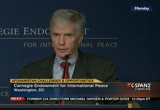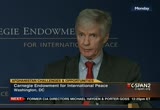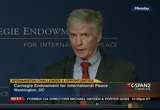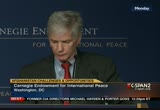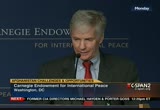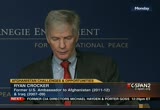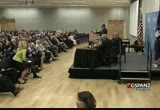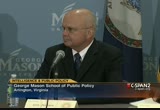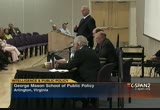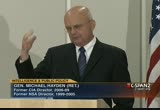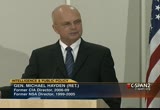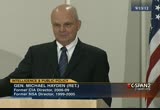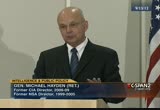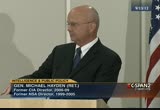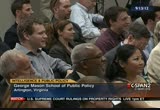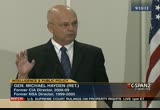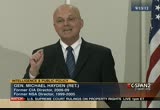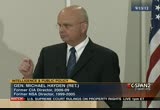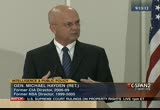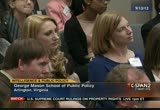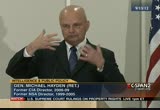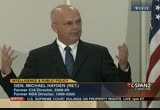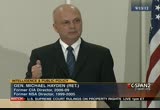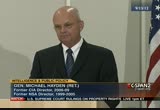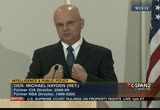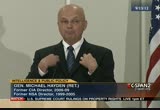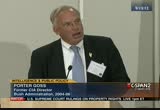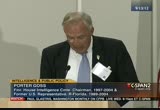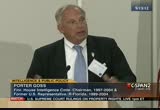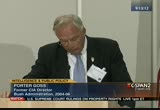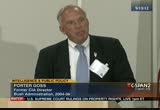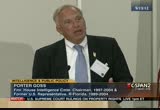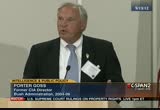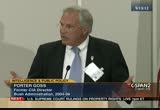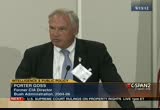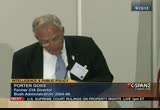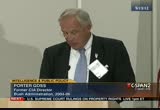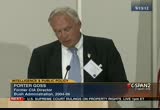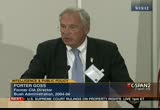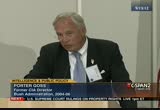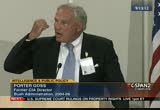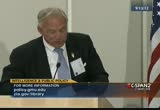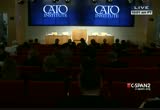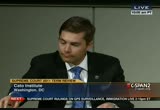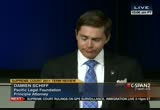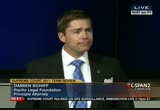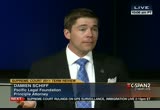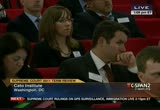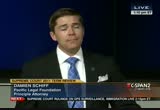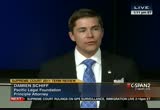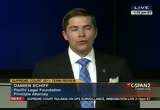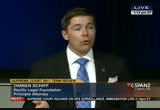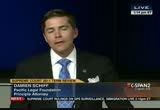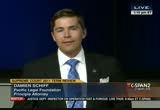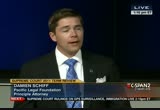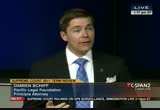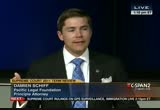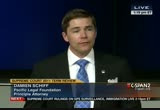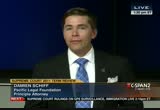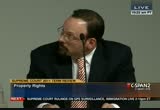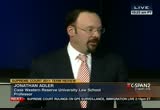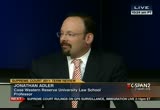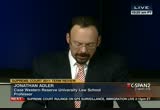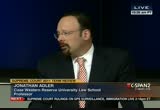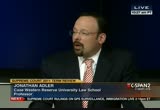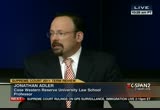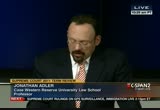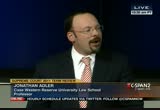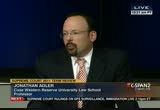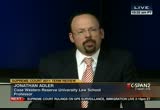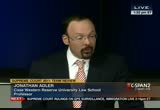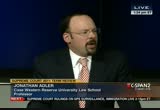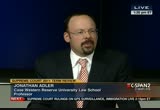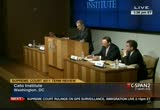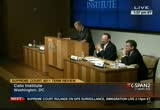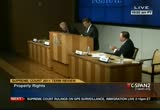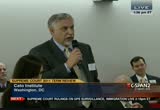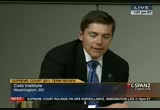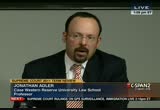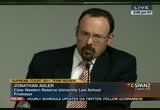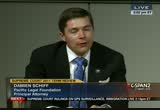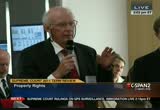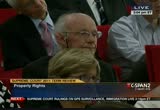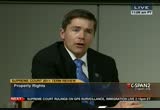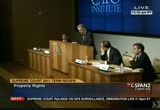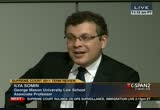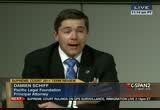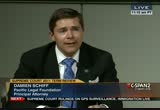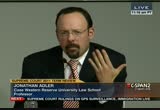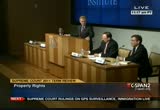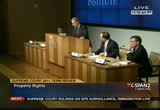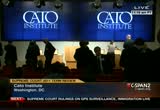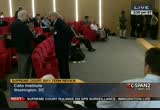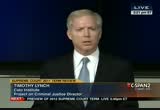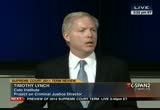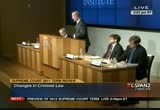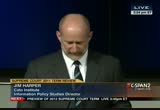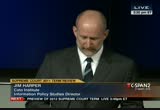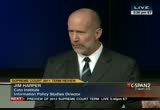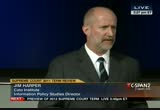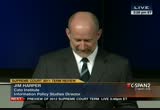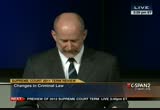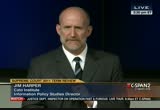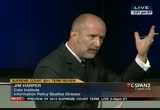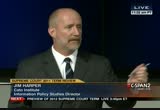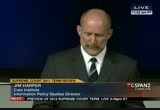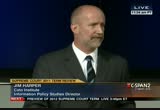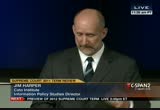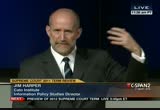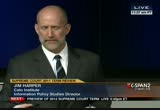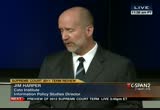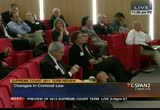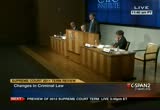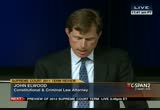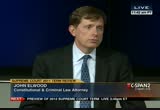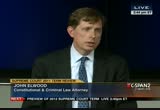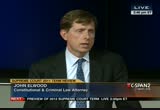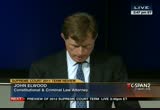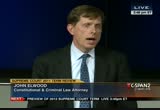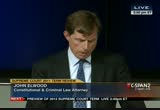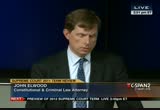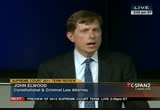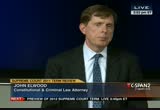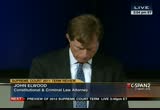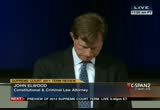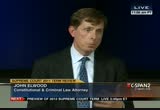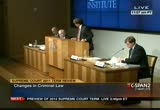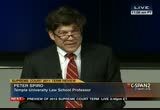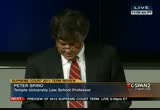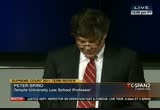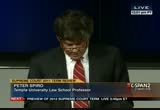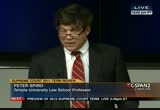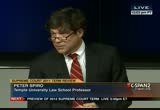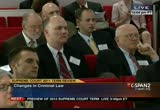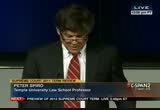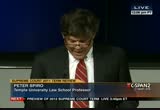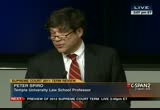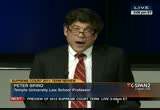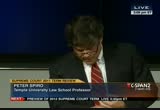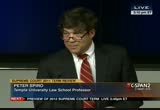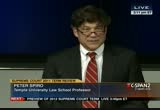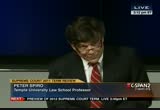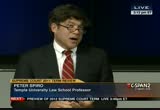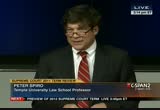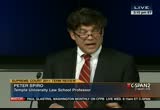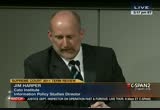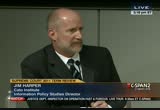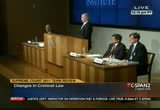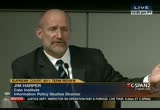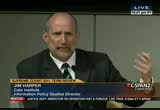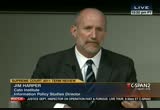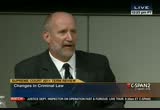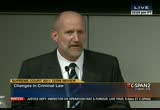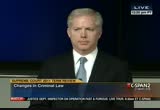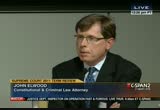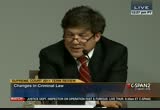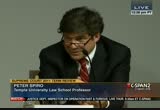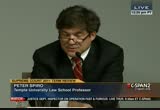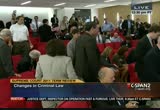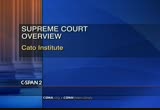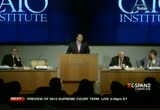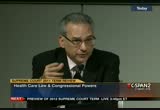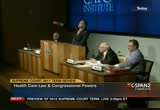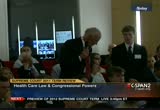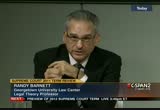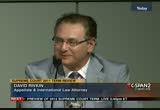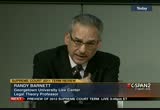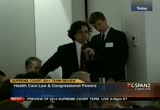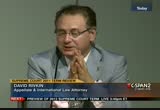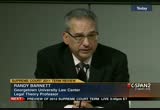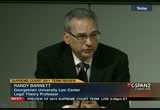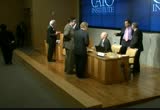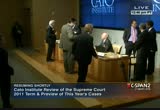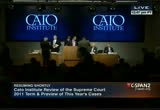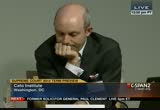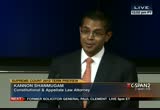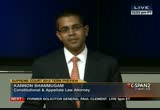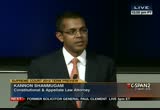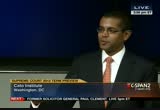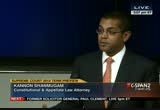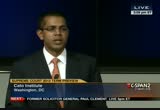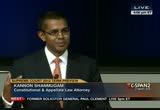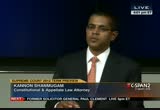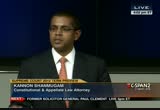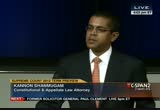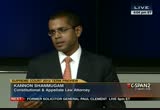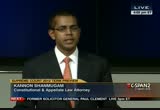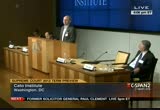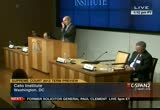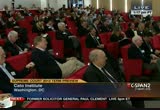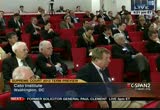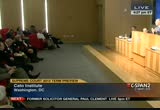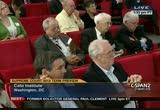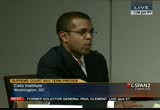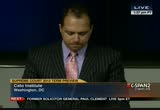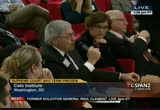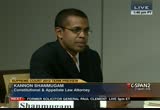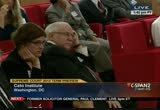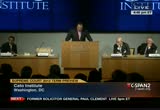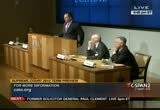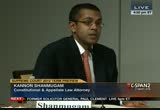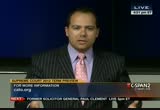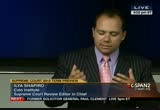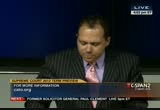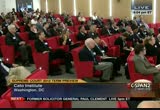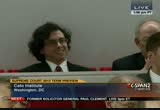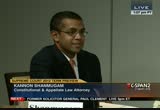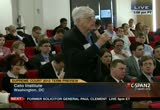tv U.S. Senate CSPAN September 18, 2012 12:00pm-5:00pm EDT
12:00 pm
>> and how can we fashion a practical, coordinated approach? in my long experience in the region, what we have not done is, um, evolved a working trilateral mechanism that is senior enough to carry weight and authority, but not so senior that it can't on itself make proposals or shape decisions, you know? we're talking about, you know, a couple of levels down. we've done that sporadically, we have not done it in a sustained
12:01 pm
fashion, and i think this is the time. india and pakistan, of course, have done it for years at the foreign secretary level, more quietly at the level of national security adviser. perhaps great successes have not been rebeller ised -- registered, but great disasters have been avoided. and i would like to see a trilateral mechanism. it exists at the foreign secretary level, it just has not produced anything because i don't think the participants have had adequate mandate. this is the time precisely for the reasons you state, and that is what i would like to see all three governments focus on moving forward. and i won't get into the complexities on the pakistani side. you know them better than i, and we don't have that extra hour and a half. [laughter] but to ambassador schafer, i
12:02 pm
guess i'll give you a flip answer which isn't completely flip and then a more detailed one. you know, first it ain't 2001-2002 anymore. you know, it was after 9/11 that president musharraf made his historic decisions on the overflight routes, resupply routes, basically, to line up with the u.s. in the fight against taliban and al-qaeda. you know, he took these decisions and implemented them before there was really a whiff of an insurgency. that came, that came several years later. so if you're comparing -- you've got to compare on time where we were '01-'02 with pakistan which was in a pretty reasonable place and where we were with afghanistan which -- with iran which also, you know, showed
12:03 pm
promise. both went south in very different ways and very different levels of magnitude, but that was in subsequent years. i think a real question is, okay, is there a way to return to some kind of discussion with iran brokered through the iran, not track two, please. i think there may be. and here's why i think it's important. the iranians have always pulled their punches in afghanistan. they could have been a lot worse than they have been. the only explosively-formed projectile, efp, that killed so many americans in afghanistan we've ever found evidence of in
12:04 pm
iraq, sorry, the only one we ever found evidence of in afghanistan was an inert one that we believe was left for us to find as a reminder, say, you know, we're only using one hand and only three fingers on that hand. they're not doing that to say because we're fundamentally nice people and we don't want to hurt anybody. i think it is a signal that they're, you know -- there, you know, still is something, perhaps, to talk about. and i would like to see us explore that if we can. now, i've got to tell you, you know, i have one great quality that i've always brought to the foreign service which is my inherent expend about, you know -- expend about, you know? ship him out. if it works, great, if it doesn't, you know, we didn't lose much. [laughter] so i mean an authority to
12:05 pm
maintain the iranians. i had it, obviously, going back to '01 through '03. had it again the whole time i was in iraq, did so and retained it in afghanistan. couldn't find any afghan -- or any iranian ready to take me up on it. you know, maybe it was because i was standing in front of their gates saying, hey, i'm the american ambassador, want a cup of coffee? [laughter] but i think it is still out there worth creative minds pursuing, and i think we've just found another great project for you and howie. good luck. [laughter] syria, you know, i was ambassador to syria for three fun-filled years that included the transition from hoffa to bashar. our fearless prediction at the time because i got to know bashar before his father died, we had a series of one-on-ones which we conducted in arabic not
12:06 pm
because my arabic is perfect, but it was better than his english even though he studied op that moll in the u.k -- opt moll in the u.k., that's all he did. he went to classes, he studied his lectures, he read his textbooks, he in no way entered into british social life. his english has since become quite good, i think it is surging. but bashar is like his father except worse; less flexible, more doctrineaire, less agile and aware that he doesn't have his father's support. so i think this is going to be a fight to the finish. no happy villa for bashar in junta. i would like to be wrong on that. but even if there is, we've already seen the signs of it. just like what happened in my friend chris and his colleagues,
12:07 pm
the arab spring bears bitter fruit. and nowhere, i am afraid, could it be more bitter than in syria where we're already seeing the signs of sectarian divisions, tensions and hatred surface even with bashar still in the palace. you know, again, the past isn't in syria. hama was the day before yesterday, february 1982, the annihilation of a city to get at the muslim brotherhood. the sunnis will settle scores, and i would not want to be in syria when thal lo white defense formations collapse. i would not want to be a member of the defense formations when they collapse. and i am very much afraid that
12:08 pm
other minorities like christians are going to get caught up in this. i would like to be wrong on this, um, but, you know, i spent a decade between lebanon and syria. that would be my fear. >> hi, my name is -- [inaudible] the question is due to the anti-u.s. protests erupting in afghanistan, so do you think it signals the kind of failure of barack obama's policies in the middle east? thank you so much. >> yeah. the protests -- >> let me get -- >> sorry. >> let me go behind, please. >> here? >> yep. and just wait for the microphone. >> thank you. mr. crocker, in your time in some of the very troubled zones, you mentioned at the top of your remarks how it's about a risking
12:09 pm
of lives, not about pushing cookies and pinstripes. do you think the situation in libya, in retrospect, should have had more of a crossover between the militaristic end? paul corson with cnn. thank you. >> bill goodfellow, center for international policy. what are we doing to promote a political settlement? as distasteful as it might seem, i think some sort of deal with the taliban has to be put in place or else the civil war's going to continue, and even the good enough, afghanistan good enough that you suggest, i just don't see it's possible. they're tenacious, they're not about to be defeated as long as they have pakistan's backing, and i just think that much more emphasis has to be put on a political -- [inaudible] >> great, great questions, all. we have seen and i referred to them protests in afghanistan
12:10 pm
before over perceived affronts to islam. you know, what has just occurred doesn't really surprise me, and i think there's going to be trouble in pakistan too. you know, there's kind of a fuse on these things. you know, libya's a wildcard because we still don't know that much about it. hell, they don't know that much about it. but you get something pretty quick in lebanon or egypt, a little bit later in syria, about this time they've got their hands full. and then later still in south asia. and so i think this is kind of following a progression. i think on all of these, again, it's the middle east, the broader middle east. it's complicated. i think part of it is genuine outrage as it is understood. again, a lot of these people are illiterate, you know? they haven't seen a video.
12:11 pm
they're not part of political cultures where governments don't actually make videos and authorize their release, but they are made and released against the vehement position of the government in our case. but if they don't know us, they don't know that because that's not the way their world works. at the same time, i think as the libyan government has alleged, investigation will have to bear it out. you create an environment where people are in the streets, are ready to take to the streets, and then if you're part of the really organized anti-u.s. element, you hijack it, or you put your elements in behind it, you take plan x off the shelf, and you use a mob reaction to cover more specific attacks. again, we'll have to sort it out.
12:12 pm
the afghan thing doesn't look like that. but it's died down for the moment in the arab world. we may see a pick-up in south asia. in libya, again, you know, we're gonna have to see where a joint investigation leads us, you know? i don't know at this point. i think implicit in my remarks is, boy, you know, be careful where you put your troops and to what end, and beware of those unforeseen consequences. there was a loot of criticism -- a lot of criticism at the time of the decision to use an air campaign plus some ground supply
12:13 pm
to unseat gadhafi rather than boots on the ground. well, you know, it worked. you could still make the argument that, well, if we had boots on the ground, we would have been more able to determine political outcomes. you know, my instinct is, no. other than those, you know, the really few, the very proud marines of our fast teams and our marine security guards, um, i hope we reactivate the force marine expeditionary battalion that came into being after the east africa attacks. it was, as some of you know, i mean, it was a counterterrorism unit in capital letters.
12:14 pm
it isn't the size of forces, it's their ability to carry out a counterterror protection mission. and they are specifically trained for it. but i think that's as far as i would want to see a military presence go in, in libya. there's been some discussion already, well, great, you've got a fast team in now. too bad it wasn't in benghazi. the day before chris stevens was. but, again, hindsight is wonderful. thank you for the question on reconciliation. again, i touched on it, but i was getting the evil stare from ashley and jessica. i mean, it was just stereo. yeah, there does have to be a political settlement, but what it can't be if it's going to be durable in the afghan context is
12:15 pm
a settlement between the u.s. and the taliban. the taliban will use that to delegitimize an afghan government, you know? our deal wasn't with these puppets, our deal was with the puppetmasters. and it will actually, i think, lessen the prospects for a stable outcome. i think what we have to do as we were doing during my time and i know we're doing now is an intense, quiet set of discussions with the afghan government, you know? okay, who's, who's navy vulnerable, how can we work this, who can we talk to, who can do what? this is a very important topic for a serious discussion trilaterally, as you point out. pakistanis play a major role here, and as they have now learned, a lot of those guys
12:16 pm
they have been giving safe harbor to happen to have links to guys who are killing their guys. so we've got something to talk about. that needs to be part of it. because i think you're right, you are not going to get -- if you ever can -- a reasonably comprehensive settlement between the taliban and the afghan government without full cooperation from pakistan which has its own sets of concerns that need to be addressed. so, again, i said this about 20,000 times, i say it 20,000 more, it's really comply kitted. -- complicated. that's not to say there's not a direct role for us. you know, i like meeting with bad guys. i mean, it's kind of fun. so at afghan government request, i did meet with a number of representatives in militant groups who were able to get to afghanistan and enjoy afghan
12:17 pm
protection when they were there. i never asked how they got there, i didn't want to know. but, you know, at certain times the afghan government judged it efficacious to have the american ambassador sit down with, again, i won't de-- oh, hell, it's been in the press. does it move them? you know, we'll find out. we do have to be fully engaged on this, but it's got to be in support of the afghans because otherwise all you do is add a new element of instability and a new element of threat rather than, um, support for an afghan government that has its hands full. >> i'm going to -- [inaudible] one last question, and then i
12:18 pm
need to formally adjourn this meeting. matt, why don't you take the last question. >> thank you very much. molly williamson, american academy of diplomacy. thank you for your service, welcome home. my question is in the realm of unintended consequences but perhaps foreseeable consequences. this town is raging in debate about escalating conflict with iran, um, it's done in the cloud, of course, of campaign spirit. what risks do you see to our interests throughout the region should escalation continue? >> why'd you call on her? [laughter] >> [inaudible] >> molly, thank you for your service. we've played tag team through all the worst places in the world for about three decades. um, you know, there's one thing
12:19 pm
worse than an iran with nuclear arms, and that is an iran with nuclear arms that somebody tried to prevent from obtaining them by military force. you know, iranians have had more than three decades to contemplate what happened in june '81 when the israelis took out the iraqi nuclear reactor. so they've got three decades plus in which to figure out how to render a nuclear weapons capability virtually invulnerable in its totality to an air or air-mobile assault. i don't know what they got.
12:20 pm
i'd like to think somebody in government knows what they got, but, hey, we thought the iraqis had wmd. but what they got is designed to survive in its essence. i mean, they may lose an awful lot of peripherals, but in its essence that their nuclear program will be able to come through whatever we and the israelis can throw at it short of an army of occupation. and if anybody thinks that's a good idea, you know, you must have missed the chapter on iraq. you know, a very senior israeli official told me -- because this is, again, old debate -- as you look at the iraq nuclear challenge, there are two bad choices, and they both begin with a. attack and appeasement.
12:21 pm
and his recommendation is that we do exactly what we've been doing through two administrations with international support of varying strengths which is you keep the political pressure on, you keep the economic pressure on, you keep going back for tighter and tighter sanctions, you do what you can to make the people feel the pain, you start to or fuel a debate within iran about just how smart is this anyway, you know? look what's happening to the quality of our education, our health care, our economic opportunity. and you gradually but steadily raise the price to achieve a nuclear weapons capability while making it clear that should they, you know, continue on that
12:22 pm
course, some really unpleasant things are going to happen that their own people may hold them accountable for if we do our public diplomacy right. so i think that's about where i would have it, at least until after november 6th. >> burmese opposition leaderup san suu kyi is in the u.s. and is the featured speaker this afternoon. you can see her comments live at 12:30 eastern on c-span. the cato institute holding a daylong discussion of the supreme court's recent term, that's live this morning on c-span, and we'll have live coverage here on c-span2 of the afternoon session dealing with property rights, gps tracking and other supreme court issues. our coverage begins about 1 eastern. marine corps commandant general james amos speaking at the atlantic council this afternoon about the corps' new defense
12:23 pm
strategy. you can hear what he has to say at 5:30 eastern. c-span has live coverage. >> this weekend live from the national mall the 12th annual national book festival, two days of author presentations and interviews plus your phone calls, e-mails, tweets and touts. for schedule information go to booktv.org. >> former cia directors retired general michael hayden and porter goss recently talked about what it was like serving under president george w. bush. their remarks focused on the relationship between the cia head, the presidency and congress. the event also served as the official release of more than 800 recently-declassified documents covering the first four cia directors. this is just over a half hour. >> we'll finish up on this very interesting afternoon by having
12:24 pm
a discussion, a series of presentations and then panel discussion with three former directors. i regret to say that secretary of defense panetta because of current events is unable to attend, so i'm encouraging all of our panelists here to stretch their remarks a little bit, and after they give them, we will open the floor to questions and answers. i'm assured by all three that stretching their remarks is no problem whatsoever. [laughter] so i feel relieved about that. and we'll have a, i hope, a pretty nice conversation just as we did in the previous panel. we'll get started with general michael hayden. of course, for many of you very, very familiar. for those of you who are not aware of his illustrious career, he was director of the central intelligence agency, the first person to be only that in our history. as you recall, there was the transition, and he served in that position from 2006 to 2009.
12:25 pm
he's also the only director of the agency who was also director of that agency across the river and up the baltimore/washington parkway called the national security agency where he had a long and illustrious career, and i've already alluded a bit to that as well. i've always considered general hayden an intelligence officer who wore a military uniform which i think is important in understanding his character and insight and why i think he's made an important impact on the intelligence discussion. he'll lead off with certain topics that we fed them earlier on to stimulate their thoughts on reflecting on their career, and then we'll follow with mr. woolsey and mr. goss. general hayden? [applause] ..
12:26 pm
but, that linkage between the intelligence person and the executive and then i will spend most of my time on that. but then i would like to talk a little bit about the relationship with congress. since we have a former member here in porter, i think he can illuminate far better than i. let me start with the relationship between the intelligence person and the decisionmaker. all right? the examples i will kind of use is the intelligence
12:27 pm
person at the national level and the decisionmaker kind of in the oval office. and how does that work? and what i generally point out, and i have actually done this to other audiences, you know, kind of more broadly. i said if policy is made in a room, okay, if i can describe it like this, okay the intelligence person and the policymaker, the dci or the dni, the dci a and the president, they have got to be in the same room but they surely do not come into that room through the same door. they come into that room with incredibly different perspectives. let me give you a couple of kind of yin and yangs here in terms of the intelligence person and the decisionmaker. i would like to believe the intelligence person is absolutely fact-based, all right. he spent the last 24 hours going through cables and imagery and intercepts. in any event he is
12:28 pm
fact-based. the fellow coming through the other door is not generally fact-based. he is generally vision-based. think of your own voting behavior and when was the last time you pull ad lever for somebody because he seemed a real master of the facts, okay? usually get as laugh. i don't intend that to be disrespectful but i do get that reaction. no, you vote for him for the vision thing. you vote for him or her because where he or she intends to take us. the guy coming in the room over here, the guy from the ic, from the intelligence community, he or she is the world as it is person. fellow over here is the world as we want it to be. i've taken enough philosophy courses in my undergraduate years to know the difference between inductive and deductive reasoning. this fellow over here is
12:29 pm
absolutely inductive. he is swimming in a sea of facts, and from those facts he or she attempts to draw a generalized narrative to prevent -- pre-sent. the fellow over here, absolutely deductive. he or she is trying to apply his or her first principles to a very concrete situation. and then finally, this person over here is inherently pessimistic. okay? bob gates has, one of our predecessors has a wonderful of way of describing the intelligence analytic workforce at cia. he is fond of saying when a cia analyst stops to smell the flowers, he looks around for the hearse. okay? [laughter] the fellow over here is inherently optimistic, think it through, he is inherently optimistic. otherwise he would not have interviewed for the job.
12:30 pm
okay? he has to think he can make the world better. so what happens in this intelligence, presidential, dci, president, intel decisionmaker dialogue is that this person over here has to be true to everything i just described to you. fact-based, inductive, somewhat pessimistic, the world as it is. and yet meet this other guy, deductive, vision-based, world as we want it to be inherently optimistic and not break his tether to the world that he represents. that is an art form. it is not mastered by every practitioner. it is really useful, it is really useful when the president recognizes that and tries to meet you part way. but fundamentally that's not his responsibility. fundamentally, it's this person's responsibility to get that fact-based,
12:31 pm
inductive, inherently pessimistic narrative in front of the president. better than that, in the president's head. even though you know with every sentence you are uttering you are making this man's day worse than it would otherwise be. [laughter] now in addition to being true to the facts, let me offer another thought that this person coming in this door really, really has to be aware of. he just can't be right. it's just not getting the facts lined up correctly. and by the way, this is kind of discovery learning for me and maybe i understand this more now than i even did in government but, in addition to getting the facts correct, you've got to get the story right too. you've got to get the narrative out there in front of the decisionmaker. i know most everyone in this room are redskin fans and you're already looking up where the super bowl is this year and trying to make
12:32 pm
reservations after that first game. all right? i used to tell a story on you redskins fans. i'm a steeler fan so i felt free to do it. two or three years ago when things weren't going so well, you could ask anyone, so what's wrong with the redskins? and the answer you would get, the owner was meddlesome, the coach didn't have the respect of the players, they didn't have an nfl caliber quarterback and their line wasn't very good either. all four of those facts are true of the what is the dominant narrative? which of those four do you need to pay most attention to make the redskins a better team? frankly i thought it was the owner but that was too hard to do, so you worked on the coach, okay? okay. i'm sorry. i'm making light of it. let's look at something very real. what is going on in syria? what's the narrative in syria? the popular narrative in syria right now is the one you see on cell phone videos
12:33 pm
every night on your news. okay? a horrific war between the oppressed and the oppressor. that is absolutely true. but it may not be the dominant narrative. there are other things going on there. and when you present this to the decisionmaker you've got to make him aware of that. this is, for example, sunni versus alawhite and the kurds and christians haven't voted yet. they're out of this. this is sectarian. this is also sunni and shia. this is all about the shia crescent and the iranians. you know, as strange as it seems, it may harken back to that east-west thing with the russians vetoing resolutions in the u.n. security council. those are all true stories. those are all fact-based. but when you're talking to the president in the sit room which of those are you going to tell him is the dominant narrative?
12:34 pm
which is the one he needs to pay most attention to before he makes his decision? okay. i guess the other thing you have to realize is the intelligence officer too. it is that you're not the only input to this fellow. there are other people he can and should listen to before he makes a decision. okay. i mean you would like to be respected. you would like to get into his head. you would like to, you know, fact-based, inductive world as it is and get that in there but he may say, thanks very much, and make a decision that is broadly inconsistent with what you just told him. and that's okay. because he has other things on which to base, base a decision. it could be personal values. it could be national values. okay. let me give you two examples. one has to do with a place called el kabar. that was the site of a syrian nuclear reactor,
12:35 pm
almost certainly built in the eastern syrian desert by the north koreans. it was destroyed in an israeli airstrike in december of 2007. okay. we really got on to el kabar in the spring of '07. okay. clearly the president really was leaning on us to get the story right. now if you recall the recent history of my agency, okay, in terms of calling balls and strikes about potentially nuclear powers along the euphrates river, we really wanted to get this one right, given the past history, what the iraq national intelligence estimate. so we drilled down on it and in a seminal meeting, kind of pivot point in all this took place in the residence of the white house, not in the oval, because the president obviously wanted to keep this very secret because, if word leaked out we were onto this, you would have the bashar al-assad
12:36 pm
memorial montessori school and daycare center built right next to the reactor at the speed of light. so you need to keep it secret, okay? so we met off schedule in the yellow room in the upper floor of the residence and the president turns to me, says, mike what do you have? and i said, mr. president, that is a nuclear reactor. north koreans and syrians have been doing this stuff for about a decade. the north koreans built it because they're the only ones who built this style of reactor since the mid 1950s. there is no way the syrians would do this without being part of a nuclear weapons program, got it? reactor, north korean, north korean build it, nuclear weapons program. mr. president, there's something more. based on the evidence we have it's a reactor, you bet, take it to the bank. we don't use slam dunk anymore in these dialogues, but we pretty much told him that was a sure thing. high confidence was the technical term.
12:37 pm
north koreans and syrians have been doing this for 10 years. high confidence. we have got a mountain of evidence. north koreans built it? of course they did. they're the only ones to have built this kind of reactor in 40 years. but we're not on the ground. didn't see it. so i want to give you medium confidence on that one. then finally, mr. president, it is part of a weapons program? of course. why else would they take this risk? but i can only give you that with low confidence because i can't find the other stuff. i can't find the reprocessing facility. i don't see the work on a warhead. so that is low confidence. and president bush records in his memoirs at that point he said, all right, based upon what the intel guys just told us, our preemption doctrine which requires imminent danger, that criteria has not been met because mike just said, low confidence, part of a weapons program. i have never seen the intel briefer and the
12:38 pm
decisionmaker gears in just about a one-to-one ratio as much as i saw on that afternoon in the summer of 2007. more generally, it is indirect. more generally what you get to do is to create the left and the right hand boundaries of a legitimate policy discussion. but it is not a syligism. the other example, the surge in iraq, in 2006. we spent the fall of 2006 absolutely laser beam focused on, looked like one of daunte's circles of hell going on in iraq at the time. what are we to do about it? the bid on the table was to double down. was to send five brigades, five american brigades into iraq and i'm there with my deputy, supported by a whole phalanx of cia analysts and
12:39 pm
what we told the president and the vice president was, mr. president, you put five brigades of professional, nonsectarian combat power into that war, you are going to push the violence down. you are going to make baghdad a safer place. but, mr. president, you're making baghdad a safer place to create the political space for the iraqi government to make some very fundamental decisions. they have got to take advantage of the space you're going to buy them with american blood. and, mr. president, nouriel maliki is not a high probability shot. mr. president, nouriel maliki, has spent his entire life in exile. he has a conspiratorial view of the world. he think there is a baathist behind a bush and most are trying to kill him. for much of his life that was actually a rational response in his environment.
12:40 pm
he spent most of his life in exile. this is the man you're betting on to be inclusive to create a iraq for all iraqis sunni and shia, arab and kurd. if this is going to work, mr. president, he will have to govern beyond his life experience. okay? and, this is figurative. this wasn't a actual conversation but fundamentally, i think what the president decided was, i got it. this is going to be really hard to do. i appreciate your analysis. send the brigades. okay. left and right-hand boundary. and at the time, and i still believe it, the president's decision was behind of here but it was between the left and right-hand bondary. oh by the way he had a personal video teleconference with nouriel malaki three times a month for the rest of his term knowing this human being will need some coaching and mentoring if he is going to do the kinds of things we would hope he would do for iraqi society. do you get the, the role
12:41 pm
here of the intelligence person? okay. it's an input. it is an important input. it probably does set boundaries beyond witch legitimate policy can not wander but it is really ever the kind of sygilism we kind of had with regard to el kabar congress, i will be very brief because we have got a congressman here. in the intelligence community, particularly in cia, particularly when you're talking about covert actions, you are operating on the outer edges of executive prerogative in our system of government. so this relationship is always spring loaded to be tense and as i think porter said earlier, it really puts some burdens on human beings to leap over the built-in structural tensions that are part of this relationship.
12:42 pm
i used always say when i went up to testify i was sitting between not one but two sets of tetonic plates. okay? one set was labeled republican and democrat. particularly in the 110th congress which would have been 07-08, with a weakened republican president, democrats in control of both houses with everyone having eye on the election, those two tetonic plates were really banging but they aren't the biggest plates. the republican, democratic tetonic shifts are important but they're not the biggest ones. the other two plates, the ones that really affect you, are labeled article i and article ii. they are inherent in the constitutional system and as much as it is an art form to come in this door in that room and talk to this guy and make him happy to see you every morning even though you're telling him things that make him sad, okay, it requires an art form as well to have that dialogue as a representative of the executive branch,
12:43 pm
with the legislative branch who clearly has an absolute responsibility over what it is you do. it does put, as i said, it's hard work and requires people to work very hard to make this kind of system as successful as it's been. thank you very much. i know my colleagues have a lot more to offer, so i will sit down. thank you. [applause] >> our last speaker of the day is porter goss who was in the unique position of being both the dci and the dci a. two other unique aspects of his career. the only director of our agency who previously had been a clandestine service officer and left the service and came back to it. we had a couple that went
12:44 pm
through the ranks in that capacity. is the only director of the agency ever to run one of the oversight committees. very unique perspective and welcome to porter goss. [applause] >> thank you very much. i think i need to go back to the introduction to my life and to public service. i retired from the agency after, in '72 or so after a medical problem. and, i found that when i, went out and got involved in public service i had to account for those 12 years of my life and i was undercover and nondisclosed and all that and taken the oath very, very seriously and tried to ignore all that but we had to deal with it and so we just came right out and said, okay, i worked as a clandestine services officer for the cia for 12 years and let it go. well my advisors when i ran for congress some number of
12:45 pm
years later said, my god, we would better pull that right away. so they polled the fact that i had worked for cia and i was running for congress to see how it would come out. i had done a few other things in my life. we included them on the poll. one was county commissioner. i had gone to college, had graduated a few things like that. turned out cia came out very well in the poll in my district in southwest florida which is a little conservative. what they held against me and polled the lowest that i went to yale. university [laughing] i believe strongly in transparency and i believe very strongly in intelligence, we absolutely need it but i feel very strongly in the oat i took to protect classified information. it is critical for those who understand the intelligence to honor that commitment because that is the trust we work on and unfortunately it has gotten to be a little bit murky what's classified and what's right to know and how you treat the first
12:46 pm
amendment these days. i say that because it's very relevant to my meeting with president bush and you would probably ask why i as a member of congress with a very nice bert as a chairman of a good committee. vice chairman of the all powerful rules committee of the house, would possibly want to sacrifice a wonderful career like that, listening to a president who might offer me a job that might be over in two months, even before i got there, that would require being, not only going through financial disclosure very, and divestiture that goes with that and confirmation by the senate, that process all adds up to my view of qualifying for torture under the geneva accord and i will tell you the question i did go through my mind when the president asked me to come to the white house to talk about this, when everybody else was out of town and i
12:47 pm
agreed to do it and i did it partly out of a sense of duty because i've been talking to the president some number of years before, i didn't know him that well, but sometime when he was the governor of texas he called me out and he said, tell me who you think should be the director of cia if i get elected? i said, well, sir i think you should continue with george tenet for a very simple reason. we had too many director changes in recent years. we're in difficult times. a lot is going on and i think we need continuity in the position. and since george had announced his retirement just a month earlier, very unexpectedly in my view, i felt an obligation to go at least see the president when he asked me to come by because i had recommended george to him. you might ask what compelled me to sit down at that time and give him my best advice and agree to serve?
12:48 pm
it was pretty simple. we talked about, what he wanted out of the intelligence community. and i said, what would you expect of me if i really were the best candidate for this job? and he said, well, first of all, you've got to build up the capabilities of the community. i would like to ramp up the central intelligence overseas mission by 50%. i said, how much time? and he said, as soon as possible. and i said, that's years but we could do something with capabilities i am sure. then he said, i want you to steer cia and the intelligence community through the new intelligence architecture which we are going to have. we don't know exactly what it's going to look like yet. we don't know whether we'll have a dni or something else but i would like you to steer it through that. and then, i like you also while you're on the hill to see if you can cur this partisan politicization which manifested all this leakage and bad spirit and
12:49 pm
declining cooperation and lack of trust that we're experiencing over our problems with wmd in iraq. and he said, finally, he said i would like my briefing to be a little bit more suited to what i need and what i want. and you said, sir, is that all you want done in two months? and he said, yeah. he said, what would you require? and i said, two things. first of all, i said, i very much believe that the dci and the dci a should be a be secret. we have a lost friends counting us to be secrets and protects our people doing their job. so that is very, very important to me we live up to that obligation. and, i think as part of that obligation i don't want to
12:50 pm
be used as a assistant secretary of state rolling out the red carpet, doing the negotiations, oh, here comes the director of cia overseas doing policy stuff. and the second thing i don't want to do is policy stuff. and the last part of that is, frankly, sir, i don't want to be quite as familiar with you as part of your family of people here, in your power center as my predecessor would have been. i say that with full respect for my predecessor. i just honestly believe there needs to be more distance between the dci and the president. and i say that for a bunch of reasons. the extraordinary privilege that the dci. the dcia had that time in those days having the president's ear every morning for half an hour or so to start his day to talk about just about anything and brief him on things he had to know. now i didn't have to go
12:51 pm
wrestle with cabinet officers which is a good thing because they all-out rank me. i didn't have to go wrestle with a lot of committee chairman and so forth because i understood what the needs were in the community and i understood as a member of congress how to get them done and i knew those chairman on a first-name basis. so i had something to offer in this basis how i could help him to get some of this stuff done but i was in the in way thinking it would be an easy task. and, he sort of, sort of caught me off-guard and said, you know, he said, i think you ought to check with somebody on this. i said, who would that be? he said, how about your wife? i said, you know, you have a great point. he said, what is her number? i will call her. i honest to gosh couldn't up with her number. i don't call my wife a lot. she calls me usually. that turned out to be a very interesting time. what jim woolsey told us i
12:52 pm
think about his early time and his confirmation process as it were, his vetting process is very different in a wartime. we had, this was a war-time footing and i was acutely aware of the problems what was going on. weapons of mass destruction, all the problems we were having, politicization of that program. it seemed to me building up the capabilities, you recall that in 2004 our job was to get bin laden. we were worried about terrorists. is this going to happen again? are we protecting ourselves properly? this is a very different atmosphere from the '90s or even today i would guess. so one of the questions that we discussed, and i think i could say this without violating any trust, was how to marry up the title 10 and the title 50 capabilities, the intelligence capabilities and the military capabilities we have overseas to fight an unconventional war where we have really no clear rules of engagement yet about how
12:53 pm
we do this. we're talking about wanted dead or alive lists on the one hand. rules of engagement memos. i got ask by a senator for the about the biv memo was. with were working on my committee how do we catch these guys, how do we develop the capabilities? who does what to fly or something else to help us. so marrying up those capabilities got really to job one so that we could actually grow the overseas mission and redirect the agency to being an overseas agency, cia that is. now the second thing of course was the coordination of the community because that was the big bugaboo that the 9/11 commission pointed out. these folks don't talk to each other. they don't share. we pointed out that it's not a question of needing to know. it's needing to know with whom to share. that's the key point of the yes, you have to share but
12:54 pm
you just don't push everything out down every pipe or you end up with wikileaks or something like it. you've got to be a little smart and a little responsible about how you get this information out. so we were going through all of these reinvenss what will happen to the intelligence community. all of this at a time when the intelligence community was under some severe criticism because of the wmd issues. what had been missed there and the fact that we had not yet gotten bin laden and we didn't really understand how we were going to get, in the public's perception, a deal with all of these unconventional bad actor characters who were trying to kill us. the second part of that was the question of that was asked about, well, what skills and experience did you particularly bring to this? dave asked us to consider
12:55 pm
and i would say this. that i think that i was able to break through the barrier on the hill by exceeding my remit in a lot of my briefing. when i briefed the oversight committees on the hill i usually went by myself. i did not take intelligence staff with me, i didn't take agency people with me. normally if there were questions about unbudget or stuff like that required those people, we would set up a special hearing for that but i went up there to speak to myself so i could talk directly to the members of congress on a first-name basis and share with them, look, i can tell you this much and maybe a little more. i don't want to get in trouble down at the white house. this is as far as i'm allowed to tell you but you can interpolate this from it. and i had a good working relationship. there was a lot of partisan sniping going on. intelligence was becoming a weapon of choice for the election as you will recall in 2004. but even so, we were able to work through that and likewise wit it on the
12:56 pm
senate side. unfortunately that turned out to be a downhill spiral after the election and president bush got reelected. things started to sour up in iraq. the wmd thing clearly was a goof. we had some other things that didn't work out quite as well and the partisanship just kept developing and that was my clearly biggest challenge. an interesting sidebar on that, i served on both sides of the table, from the intelligence side and the oversight side and i was told some things as the chairman of the oversight committee that when i got to be the director of cia i found out weren't quite exactly as they had been explained to me. that did cause some kerfuffle. i think conventional wisdom was constant turmoil. that would not be true. that would be quite an exaggeration but there are a few people who i think had been sailing a little bit close to the wind in how
12:57 pm
they were sharing information in the tell defense -- intelligence information sharing with the oversears. i called them on it. i'm glad i did. i think that was the right thing to do. i think that situation has improved today but we still have not solved the problem how you stop leaks on the hill. we never will. so there will be always this question of accountability on classified information. the more people you share with the harder it is to find out if somebody is creating some mischief. so that debate will go on for a while. i do honestly believe though that the oversight committees have done a pretty darn good job of keeping the information quiet. there have been some celebrated cases but i'm satisfied they're doing their job pretty well. the second part i'm unhappy about, and this is a little bit sensitive, we have an ig system which i think is very good. i think we should have an ig system. i helped write the
12:58 pm
legislation actually. i think mike shaey and suzanne were there when i wrote the legislation. i honestly believed the igs would be a good channel to assist the whistle blowing process on anything going on executive brand. any member of congress would agree with that. when i got on the other side and said, wait a minute. these guys are back channeling stuff up there to members of congress i'm not so sure i'm signing off on all this yet. and we found that those channels that were opened up legitimately for the igs to report back to the oversight committees were being, shall we say, heavily used and quite often, particularly at wartime, you will find that there are differences about policy. and not everybody is completely aboard with the policy of an administration at a given moment. i dare say that is true for any administration at any time but i demand there be
12:59 pm
loyalty and honor to the oath we had took to serve the commander-in-chief and to keep the material classified. that did cause a little consternation with some people who felt they knew better or felt they had a better policy and a better way of expressing it usually through "the new york times" or "new york post" or "the washington post." those were difficult things. that's why you get paid the big money. but i will tell you the reward. the reward is this. when people come in and say, thanks, boss, you gave me a great opportunity, we got it done, we got this guy, we did this, we succeeded, that is really what makes your day. there are enough of those days to make it worthwhile. the downside of that you get a call from your friend overseas who stuck his neck out and his family's neck out for you and running a difficult intelligence operation in a different country with a very different approach to national security, and security services and he calls up and says, my god, porter, what the heck have
1:00 pm
you done to me here? i read in the paper today, i got parliamentarians all over me. yeah, what are we going to do? what is this story in the "washington post" today that says we've got a black site in our country for god gosh sakes? what am i supposed to do. i can't tell you how dismaying it is for them and the director of central intelligence for the dci or now the dni. because that means, we have betrayed a trust. and this is a trust involving life, and death. and there are a lot of people overseas right now who are going through difficult moments which would be a polite way of saying it, because they have read too much stuff from too much talk for whatever motivation on in our press, in our free democratic society. with that right, goes the responsibility, to recognize the properly classified information needs to remain classified. having said that, i'm going to sit down and answer
1:01 pm
questions, hopefully openly. [applause] >> the u.s. supreme court beginning a new term october 1st. a live picture now from the cato institute where they're hosting a symposium today that will review the court's previous term and look ahead to what is on the docket for the new term. this afternoon speakers include former solicitor general paul clement, who argued unsuccessfully against the health care law last terrell. and scotusblogs tom goldstein. we expect the event to get underway momentarily. . .
1:02 pm
1:03 pm
to our c-span audience. this is the second panel on this, the 11th of the cato institute's constitution day conference. our second panel takes up the court treatment of the right, the founding generation took to be fundamental the right to property. indeed in his famous essay entitled property in the 1792 national gazette, james madison, the principal author of the constitution, wrote that, and i quote, as a man is said to have a right to his property, he may be equally said to have a property in his rights, thus echoing john locke's famous reduction of rights to property, broadly understood as he put it as lives, liberty and estate. today of course property rights
1:04 pm
treated as chief justice rehnquist famously put it like poor relations of a bill of rights. and in three main ways. first, when property is taken through the power of eminent domain it often is not for public use and rarely does the owner to receive just compensation as required by the fifth amendment of the taking of the clause. far worse when regulators took otherwise legitimate uses of property in order to protect the rights of others not to protect the rights of others but protect the public with various goods like wildlife habitat leaving the empty title with the owner really doesn't pay the owner compensation for the losses he suffers through such regulatory takings as they are called. and finally, the procedural hurdles owners have to overcome when they tried to vindicate the
1:05 pm
rights are often draconian ranging from an interminable permit delays during which time nothing can be done with the property, the so-called williamson county problems that tucker at shuffled and much more, all of which can exhaust and owner physically and financially. as the government regulators understand only too well. in fact, we begin today's discussion with one of those procedural hurdles as it arose last term in the case of sacket versus the epa and here is the man to start us off before he argued in the supreme court, damien schiff. i'm going to introduce the speakers each one before he speaks. starting with damien of course. he is a principal attorney for the pacific legal foundation where he's worked on a number of cases involving the endangered species act and the clean water act. he's a magna cum laude graduate of both georgetown university
1:06 pm
and the university of san diego's cool wall, after which he clerked for jim victor woelski on the federal claims. among the several environmental cases damien has litigated, the bottom timber company, the epa, in the ninth circuit court of appeals held as landowners did have a right to challenge environmental regulations and reduce their property value. like other of the panelists today, damien has published widely and has made numerous radio and tv appearances. so please, welcome damien schiff. [applause] thanks for the kind introduction and to the cato institute for having me here today to talk about a case whose facts justice alito from the bench of the argument has passed january remarks of the facts were related to the average american homeowner, the homeowner would say how could something like this happen in the united
1:07 pm
states? mikey and chantell sackett our land owners. they bought in 2005 a half acre parcel of land in idaho on which they planned to build their dream home. they obtained necessary building permits, and they started construction in their home in the spring of 2007 by putting on to their lot a bit of gravel. three days after that, the epa and army corps of engineer agents came on to their property and told them that they had to stop building their dream home because they were violating the clean water act. when sackett asked the epa to the court to provide some sort of written explanation as to why the need a federal permit to build their home, they were given the explanation in the form of a compliance order issued by the epa under the authority of the clean water act. this compliance order charged the sacketts of having violated the clean water act and immediately restore their property to its alleged status come and make available to the
1:08 pm
epa at any moment access to their property and to the business records. and if the sacketts did not comply with this order, they were threatened with come at that time, duals finds a to $32,500 per day. sacketts filed a lawsuit on their behalf and challenging the fact this compliance order was illegal. that there are no weapons on their property therefore they do not need a permit to build their home under the clean water act. the district court and the mind district court of appeals on appeal held that the sacketts had no right to follow their lawsuit challenging epa for this exercise when it's abuse of authority on the grounds that the congress, when it enacted the clean water act, never intended property owners to have the right to sue when they receive a compliance order. and the ninth circuit said welcome this doesn't really violate the sacketts to process rights either, because the sacketts can always apply for
1:09 pm
permits or they can simply ignore the order. and epa can only do bad things to the sacketts once they bring a lawsuit in federal court to enforce their compliance order. and until that happens, the sacketts can ignore the order and not worry about their mounting civil and potential criminal liability. the sacketts successfully sought review in the supreme court, and in march of this year, the court ruled 9300 that the sacketts to have a right to challenge their compliance order under the administration procedure act. the decision i think is an important one for the property rights and for the individual liberties generally in ushering that when a property owner -- when anyone is injured adversely by the agency action, he can have a right to his day in court to defend himself. and i think the sacketts decision will be an important one not just for how the clean water act is administered, but also for how the administrative law generally operates.
1:10 pm
first of all, i think the decision under the clean water act would mean that there will be fewer complaints orders issued. i think it's fair to say that before the sackett decision when they knew they could issue one of these workers, and putting landowners under significant threats of tremendous financial civil liabilities, and knowing that that if they were ever held in to account for having issued this order, i think that made the agency very brazen. they knew there was a judicial check and they needed to worry about whether in fact there were weapons on the property. whether in fact there had been a violation of law. now of course with the threat being held in to court, that means the agency would be a little more modest in the use of its enforcement capability. i think also that when the epa does issue these compliance orders i think we will find they will be backed by significantly stronger records. the remarkable thing is they have been unable to use their property for the last seven
1:11 pm
years and yet the epa has never filed in court any of the public documents showing why they believe that the sacketts have weapons on their property. and that is remarkable because notwithstanding the fact that they have never seen any evidence of their wrongdoing, they nevertheless have never been able to use the property for going on seven years. now i think with the sackett decision, epa won't be able to do that. not only will it have to convey its record to the compliance order recipient, but more importantly, the epa will have to do its homework before issuing these orders. that it can't rely on the fact that the regulated public has no means of enforcing its rights when it believes that the agency has gone too far. i think also we've already seen one benefit of the sackett decision of the laws that could have been filed. we've heard of the courts to about the country since sackett was decided challenging the
1:12 pm
authority through other compliance orders. and i think that would continue to be a beneficial effect of the decision to ensure that when the agency does exceed its authority there will be some judicial checks on that it used. finally, i would say that following the clean water act, sackett may portend a general expansion of the availability of the judicial review for other types of actions that either the epa or the army corps of engineers take under the clean water act. for example, the army corps issues would have called the jurisdictional terminations, which are decisions from the agency saying that it believes that there are weapons on the property that it can regulate and therefore require the permit for filling them. little courts have until now said that those are the traditional review and i think with the sackett decision that ruled law may merit a revisiting. but beyond the clean water act, i think that the sacketts may
1:13 pm
portend something much more significant for the administrative law generally. with the had ministry of procedure act, you have a codification of the general presumption favor of judicial review, meaning that congress has to be quite clear when it enacts believe that it is not one to regulate the public to have an opportunity to seek a judicial review when adversely affected by agency actions. and until the 1980's, that presumption was fairly strong and the supreme court case law. clear and convincing evidence is what was cited and needed to show that the courthouse doors were closed to folks who were injured by the agency action. in the early 1980's the supreme court sort of walked away from that strong presumption and instead said well that's not really clear and convincing evidence. it's more that if we can fairly discerned in the statutory scheme the desire to cut off the judicial review and that is enough to cut off the judicial review. and it was in fact that less than standard that allowed the
1:14 pm
lower courts for the last 20 years to rule that the folks like the sacketts did not have an opportunity for the judicial review, the congress did not want the landowners to have the opportunity to sue when receiving one of these compliance orders. i think sackett may signal in some respects a free strengthening of the presumption in favor of the judicial review, not just in the clean water act, not just in the environmental context, but generally speaking in the administrative law context generally that when up one is injured by the agency action, but the agency's action there's a strong presumption that one should be able to seek a judicial review in a court of law. it is interesting though as i mentioned with of the lower courts have ruled against the position as dedicated, it is interesting how the lower courts could have bought this issue so wrong for so long. as i mentioned, it's a unanimous decision finding that they do have a right of judicial review. when the ninth circuit ruled against sat last year the ninth
1:15 pm
circuit wasn't going out. one of the few times in the case for the ninth circuit is to essentially doing what everybody else is doing all of the law were sort it because circuit courts have addressed the issue when it went out in the decision had ruled against the property owners. and i find it interesting to think how was it that a fundamental and so long that the court's more liberal wing thought was atrocious and i think that there are a few reasons for that, first of all, the political reason for why that is so is the lower courts were presented with ugly fact patterns were plaintiffs who were not particularly attractive, the mining companies are developers. rather than the plaintiffs like this packet's who are simply hard-working americans who want to build their family home and they are told that if the need a federal permit that could cost hundreds of thousands of dollars just to do that, just to build
1:16 pm
their family home. i think that fact pattern was essential not only to the court taking up the decision after 20 years of that first and unanimously at first president in the lower courts, but it was also the central to the supreme court ruling in favor of the sacketts and avoiding turning the case over into the question of is this for or against the environment. it rather developed into more appropriately something that was in the environmental law and is the question of when people were injured by the agency action, should they have an adequate means for the judicial review of indicating their due process rights. that is something that the court was looking for, and i think the to thank sat -- sackett about how the supreme court just prior to granting against the case denied them in the case called jackson which raised a very similar question about the judicial review of the compliance orders under the superfund law and they were
1:17 pm
making a very similar to process argument as sacketts were making. in fact actually while we were pending, the effect submitted a letter to the court asking the court to consider our position in conjunction because we thought that she might have a bit of a high your profile, and remarkably, certainly with ge granted in our case the thing that is in part because of who was seeking review. sackett as opposed to general electric company i think the court appreciated the better fact patterns. what does sackett say of the epa? we've heard a lot of the greenhouse gas regulation with mountaintop mining, with the clean water act and with all sorts of environmental issues where the agency seems to have a very ambitious understanding of its own authority and seems to be rather indifferent to how it
1:18 pm
is received either in the media or how it is received by those that it regulates. sackett - shows that the agency's speak for the puerto rico can sometimes come back to haunt before. the supreme court granted the review the epa had taken a hard line in the litigation and have shown them know quarter. and i think fully expecting that they would never be able to get beyond the ninth circuit. and yet, they were and they successfully defeated the epa. and one hopes there for one of them on legal effects, the beneficial effect of the decision would be that the epa might take a bit more modest understanding of its own authority, and particularly a more sensible approach to its enforcement powers. when one thinks about the fact that the epa spent so much time and effort and the prosecuting who simply put clean dirt on a half acre they bought in idaho and yet at the same time presumably chose not to to get
1:19 pm
protection against a brick activities that allegedly would have a much more significant impact on the human environment. and so, i think that the decision will have, i hope, a beneficial effect, the epa considers to be an appropriate exercise of its enforcement discretion. lastly, i would like to make a comment about what i think the case means for the public interest law movement generally. the foundation like many other pro freedom groups in this country we represent our clients for free. and i think that fact is critical to how the sackett case got to where it did. first of all, the sacketts didn't have the means to litigate the case to the supreme court. but even if they had, it would have made no economic sense to do so. they purchased for $23,000. the litigated course of to the supreme court cost hundreds of
1:20 pm
thousands, not thousands of dollars to do. and it would have been an impossibility. and obviously the epa and other federal agencies know that. they are not constrained by the enemy and our limitations and by the budget to can litigate the land owners in to the ground so to speak and the bully them into compliance even where there may be a valid claim as with the case in sackett. so i think this case as an encouragement to the public interest law movement that if you find a case with the right facts and a good legal claim that it may the erie well turn out to be successful, particularly -- particularly in my view is the case heartwarming in a sense because as i mentioned, every lower court but address the issue before the supreme court finally took it up. nevertheless, the court did he get up and it will in favor of freedom, did ruled in favor of the sackett's and landowners to vindicate those rights meaningfully in a court of law. i think that should give us all
1:21 pm
a great deal of hope that when we feel as if the tilt of the law in the lower court is going against property rights, going against freedom it does not necessarily mean that we should give up and that it is important to fight for our positions in court and hopefully to be vindicated in the supreme court. so, i want to thank again roger and the cato institute for having me here today, and i look forward to questions afterwards. thank. [applause] >> thank you, damien. by the way, in this year's supreme court review, which those of us who are watching on c-span can order at cato.org you'll find damien's s.a. as well as by the next speaker, jonathan adler on the case, and jonathan wax's more broadly on
1:22 pm
other property issues in the course of his essay. we are when you're from jonathan adler who is a professor of law and the director of the center for business small and regulation at case western reserve university school will fall where he teaches courses in environmental, administrative and constitutional law. he's a magna cum laude graduate of yale and summa cum laude graduate of yale at the george mason said school of law. he clerked for now the chief judge david sentelle on the u.s. court of appeals for the d.c. circuit. he's the author of editor of four books on their rental policy and over a dozen book chapters. he is a senior fellow at the property and environmental research center in bozeman montana and a regular contributor to the conspiracy as well as a contributing editor to the "national review" online.
1:23 pm
he's also a member of the editorial board of the cato supreme court review. in 2004, professor adler received the award given annually by the federalist society to an academic under 40 for excellence in teaching and scholarship and commitment to students. please welcome professor jonathan adler. [applause] >> thank you, roger. it's a pleasure to be back at cato. we've heard a little bit about the story of the schiff team. and there's a bottom line to my presentation today. it really says something about the property rights in the united states today that the case, like sackett, is considered a major victory. it really illustrates the comment that roger lead before that property rights are treated as a correlation among those rights guaranteed by those bill of rights under the
1:24 pm
constitution. i don't mean to diminish anything that plf did. what the sacketts got were certainly significant after waiting for years just after the administrative compliance order was issued to finally get the right to have their day in court is very important. but, that is all they got. they got the right to go to a federal court to challenge whether or not a federal agency had the right whatsoever to subject them to any regulatory burden whatsoever. the position of the federal government has been that didn't have that right. at the time when there are serious questions about the scope of the federal regulatory authority under the clean water act and with the regulatory authority is that a landowner can be subjected to fines come subjected to fines that will increase daily but has no right to go to court.
1:25 pm
to nearly become merely answer the question in my in the scope of the agency's jurisdiction? the court rested its conclusion purely on the statutory grounds. one of the things i think attracted their attention perhaps serving the issue that they could argue below was that the state of affairs that the queen water act provided would violate the due process. when the court issued its opinion in the written recitation of the history, it made no mention of the due process concerns or the constitutional questions that lay in the background and the court has also refused several recent invitation sent to the various statutes to consider the scope of the regulatory states. what i want to do briefly is focus on the due process concerns the court avoided
1:26 pm
specifically in this case and then more broadly in the federal regulation in particular. and i do this because i think there is a real to process problem in much of the way the federal regulations are implementing and then forced and it's a problem that the courts have yet to come to grips with and it's a problem that we are going to increasingly see in other areas as well just flexible several scholars have begun to look at the due process implication authorities created by the dodd-frank act and find some very serious concerns to operate the way that it is written. malae convention about the sackett case is had the supreme court concluded that the clean water act did mean to preclude the review of the administrative compliance order that that would violate the due process guarantee of the fifth amendment and that applies to the federal government. the administrative complaint order wasn't simply a warning. it wasn't a letter telling them
1:27 pm
you are violating volume you shouldn't do that because you could be subject to prosecution. it was an order that the act was itself a binding obligation, punishable by fines independent of those that can be imposed for violating the act. and he said it is initially issued by the epa it imposed a lengthy set of specific affirmative steps sackett listened we have to take. they were not told to cease-and-desist. they were told to remove the dirt, they were told what sort of plants they had to restore on the property and at what sort of space in. they were given affirmative obligations damien mentioned the access to their property of their records. they were required to inspect the property of all of these things. there is little question that the administrative compliance
1:28 pm
would have altered the obligations of the property owners that infringed both the protected property and liberty interests and we know in the fifth amendment that is entitled to the due process and the due process usually says of the very least notice and opportunity to be heard it has to be the case that at the very least was this order is issued. they should have the ability as a final agency action they should have the ability to go to court. but i think the due process concerned in this context and especially in the federal regulation actually go much deeper because we look at what the due process requires and we typically talk about the opportunity to be heard as a part of the process that is due. but we know that the due process also requires things that are even more fundamental. one of them being that any deprivation of liberty or property must be in accordance with law of land. meaning that it must be duly authorized by the legislature.
1:29 pm
we also know that individuals and the average person must have noticed of what law requires, and on both of these measures the federal regulations failed miserably. it's hard to argue that the revisions of the epa and the army corps of engineers are in the newly enacted law, and certainly like the sacketts do not have anything approaching notice. why would i make these claims? let's start with the source of the authority to regulate private land under the clean water act. the clean water act, by its terms, are from the material out of the waters. the clean water act defines as water of the united states. now the army corps and the epa have for over 20 years interpreted this to cover all
1:30 pm
water bodies interstate or otherwise navigable and all but plans that could affect the interstate commerce coming and for period of time, they even argued that this would cover all such land that could be the habitat for migratory birds. something that is commonly referred to as the goose test. what is interesting about the regulations that the epa enforced is that we know they cannot be enforced as written. the regulation as it is promulgated purport to reach what could affect the interstate commerce. we know in the united states versus lopez in 1995 the court decision since the commerce clause doesn't reach the mere potential on the commerce. there must be a substantial effect on the interstate commerce. the existing regulations don't require the substantial effect
1:31 pm
in fact they don't even require the actual effect. by their terms they only require a potential effect. they reach far beyond the scope of the federal commerce clause authority. the supreme court has twice been asked to consider the application of the regulations to the private land owners once in the case called swank. they did it merely to keep it in the constitutional bounds and in each case they found the argument that the army corps of engineers and the epa used to present serious constitutional problems and therefore the court held to not be within the scope of the clean water act. what has the agency done in response to these positions? well, and the practical purposes, nothing. they have issued some guidance documents that don't have the force of law but they haven't changed the regulations on the
1:32 pm
books. regulations that we know based on the commerce clause and based on the supreme court's decisions swank cannot be enforced as written. that is at the heart of the serious due process problem that relates to the start of the notice because one of the things that we require, one of the things that the supreme court reaffirmed just this past term in the federal connections case is that notice requires the of the notice requires the law must be sufficiently clear that the common intelligence must be able to know what it is that it's required or forbidden. if all of the statute says the federal government regulates the deposit from the material into the waters and it cannot be enforced as is written, how does a landowner have notice of what
1:33 pm
is required? when they receive an administrative compliance order from the epa, how they have any basis to know whether they are acting within its authority? this is not a situation that is like the landowners received notice from their own board or some other local entities that clearly has jurisdiction over their authority where the question we what they are requiring more forbidding in the authorization. the federal regulation would actually issue in the federal government has any authority whatsoever to impose any burden on the landowner. the corps of engineers and the epa are acting beyond the clean water act and beyond the scope of the constitution they have no authority to question or a bird in a private landowner's use of his or her land. they can point to nothing to get the private landowner indication of whether the land is burdened.
1:34 pm
they don't have the notice because there are no clear regulations that the statute is indicating whether or not they are subject to the federal regulation. and that is a serious due process problem. the due process problem for fox television when it is clear to be eliminating, or the due process problem for a company like general electric and other general electric case in the d.c. circuit that doesn't involve the first amendment concerns. they made clear this is not a first amendment rule, this is a due process rule that individuals and intelligence need to have a basis of knowing what the law requires before they can be penalized to comply with the law. the last point i want to make is when it was inspected there was an effort to suggest that individuals like the sacketts are entitled to raise the
1:35 pm
concerns because there are landowners that should have known better that were seeking to profit from their land owner and i don't know if that is true or not, and frankly, i don't care. under our system, the guaranteed due process is not dependent on one being innocent or one being nice, not one in treating the environment in the level of respect in a court of demand. our system of government is something that is guaranteed to every one. guaranteed to those that are obtained at guantanamo and those are arrested surely it should be guaranteed to those who deposit clean dirt on a part of land and how much they wish to build a house and they sought to comment on the case to file the amicus brief and suggest otherwise because it is clear in the other context how pernicious the idea is that due process guarantee
1:36 pm
depend upon the individual of the government action. this case was important because it's important that they have their day in court, but i think it also highlights the need for federal court to begin paying greater attention to the due process principles that are guaranteed under the fifth and 14th amendments because there's a lot in the regulatory state that is inconsistent in those principles. and this is not a challenge to the environmental protection or complained about the goals they lot of them seek to pursue and the recognition that these goals just like all the others the government pursues must be undertaken and pursued in the course of the principles of the constitution guarantees and hopefully after sackett will be able to pay attention to these concerns. thanks. [applause] >> thank you, john. we are now going to hear from ilya somin, who has written widely in the area of the property rights as well as other
1:37 pm
areas. ilya somin is a professor of law at george mason university law school. his research focuses on the constitutional law, property law and the study of the popular participation in the implications for the constitutional democracy. he currently serves as the co-editor of the supreme court economic review, one of the country's top-rated law and economics journals. a summa cum laude graduate of amherst college, he earned an m.a. in political science from harvard university and a j.d. from yale law school before he clerked for judge jerry smith of the u.s. court of appeals for the fifth circuit. his writings have appeared in some of the nation's top law reviews as well as leading newspapers, and he too, like john, is a regular contributor to the conspiracy. like john, ilya was once a cato in turn.
1:38 pm
for those cato in terms that are out there watching us coming you, too, can maybe one day become a professor of law. as other of our interns have done over the years. today, ilya is a cato adjunct scholar and he continues in that capacity as well. so, would you please welcome professor ilya somin? [applause] >> i would like to thank the cato institute for organizing this event and for moderating and also both of them for giving me that in turn should now 20 years ago. i'm not sure whether the prospect of becoming a law professor would increase or decrease the future in turn applications to cato, but i hope it is the former because he's doing a great job, except when you have to grade papers. fortunately that is not what we are doing here today to get instead, my job will be to hold. i'm going to talk about the
1:39 pm
montana versus montana case, and then in the second half of my presentation i'm going to step back a little bit more broadly and with the general state of the property rights at the supreme court and what issues we might expect in the next few years. although the previous analysts have said the property rights of the supreme court cut especially over the last decade for the most part have gotten very much second-class status. the court has been deeply divided over property rights issues and it's possible that some important developments are going to come down the road and things could change rapidly in one direction or another at least potentially. first ppl montana versus montana. this is another relatively rare case where the supreme court unanimously decided to some extent at least in favor of property owners relative to the government. so, this case arose from a
1:40 pm
situation where montana which if it is going to refer to ppl from now one they ro utility using three riverbeds in the state of montana in some cases going back all the way to the 1890's to generate power through hydroelectric dams and other means. for all that time, they had been paying rent to the federal government for the use of the river bed on the assumption that the federal government was in fact be one of the land. however, beginning several years ago as an outgrowth of a private lawsuit against the power company, the state of montana suddenly began to assert no weakening of the federal government, now the owners of the river beds, therefore they said ppl owed them at least $41 million in back rent just for the to recover from 2000 to 2007. even though montana have for over a century never challenged this title and even helped get
1:41 pm
federal ribaldry permits for the sound operations so there is a certain amount puts the on the state's coming back after a hundred years saying we actually owned this land all along and there's a huge amount of that print we didn't tell you for a century that we did, but now you know, so pay up. the crucial issue in montana's argument which by the way prevailed in the supreme court of montana before it got to be the federal supreme court is that there is longstanding legal doctrine and the supreme court precedent that says when a state joins the union they acquire title to the river bed of the navigable waters within the states' territory and so montana said look, when montanan joined the union in '89, we got all of this land. however, or the river bed charge was under the waters.
1:42 pm
however, as ppl pointed out, much of the river bed territory here actually is not navigable. what is the case is the river has some parts which are navigable and others which are not. so, montana rather ppl's pretension is that essentially these large parks which are not navigable and which are aware of many of these hydroelectric dams are located, these are still owned by the federal government, which had owned the land before it became a state when it was just a federal territory. succumbing essentially the supreme court in a unanimous decision sided with ppl and they said the doctrine that applies is not that it's all or nothing, it is navigable and is sent you lookit individual segments and particularly in the case like this where there are actually pretty large segments which are not navigable in one place in
1:43 pm
the area as long as 17 miles. the montana supreme court, a lower court in this case had also rely on the fact that some of these areas are also subject to recreational use, that is there are people that go and swim and fish in these areas and that is what is going on today. there for that must mean it is navigable. i think the federal supreme court rightly pointed out that what matters is not whether it is navigable to name but whether it was navigable back in 1989 which is when montanan became a state and it would have acquired entitlement to the area if they were acquired to it at all. not all of the issues were fully decided here by the supreme court. a lot of the cases have been remanded back to the lower court for the final decision, but it has been remanded of a set of rules which makes it very likely the ppl would win. the question that you might ask is if you are not the owner of a power company, you don't live in
1:44 pm
montana, why should you care about this case? the answer is at least twofold. one is as jim points out in his essay in the supreme court there actually is a lot of land particularly in the western state which is subject to the doctrine that the government can acquire potentially when they became states so as he points out there are potentially thousands or hundreds of thousands of acres of other river beds that the states could potentially try to seize to read as he puts it there's a potential friend seeking that particularly when the state's find themselves short of money they say maybe there is some land claims that we overlook the last century and we could find this land and charge people back rent or the like to engage in the same sort of maneuver the the state of montana tried to engage here. it also has potential implications for other cases involving the question of what
1:45 pm
counts as navigable waters. as jonathan pointed out, there is some reason to believe that under the commerce clause the limits of the federal government's jurisdiction over the waterways are in some sense dependent on whether it is navigable. in this case, justice kennedy's opinion for the court is careful to distinguish between the two situations. the commerce clause verses the doctrine. he says what is true for one may not apply to the other. nevertheless, there are some connections between the two so it is possible there will be some implications here in the future. we will just have to see how many. so, i think this case is potentially important for property owners and also for the federal government in particular in the western states where there is a lot of the waterways and a lot of land that was previously owned by the federal government but the state could assert a claim beginning when they joined the union.
1:46 pm
now the big picture sweeting even bigger than the majestic waterways of the western states we are going to talk a little bit about the overall state of property rights. over all the last decade hasn't been a good one for the property rights claimant in the supreme court despite occasional victories like sackett and the supreme court has a tendency to create a property rights in a very second-class way that isn't applied to almost any other constitutional rights and there are several areas where this is true. under the takings clause, for example, it requires that you can only condemn the property for public use. but in the 2005 case and in some earlier cases the supreme court essentially said that the public use is virtually any kind of conceivable public benefits, and in addition the government doesn't even have to prove the
1:47 pm
public benefit will actually be achieved. the land taken in the case today much of it is primarily used by spiro because nothing is fell apart in the built and there is no legal obligation to actually show that the economic development is supposedly justify the taking some actually be produced. there is a similar issue in the area of regulatory which is the broad question of when the government regulations severely restrict the use of property rights can arise to the level it is taking away your property rights and therefore requires just compensation under the fifth amendment generally speaking, the court has been very reluctant in especially recent years in favor of property owners in this area they have said that it is not automatically considered a taking as a permanent physical invasion when the property
1:48 pm
actually occupy your land or you permanently lose 100% of its value. so if you lose only 98% you may be out of luck or if you lose 100% for a long time but not permanently you might be out of luck as well then the so called penn central task would apply after the 1978 case and to make a long story short, under generally speaking the government tends to prevail. as we have already seen the other presentation, even under the purely procedural question often property rights are given a second-class status not extended the same kind of procedural protections that we take for granted in other areas. for instance, in the hotel case in 2005, the supreme court reaffirmed the idea that there is a very wide range of federal taking squalls and the federal court no matter what you do there is very few if any other
1:49 pm
federal constitutional rights where that is the case. in wilkie versus robins the supreme court ruled 7-to. the money damages are often available and taking the claims or in the property rights cases even in situations where they would be available for the violations of numerous other kinds of constitutional rights. for the overall picture, it is not a very positive one. there's the occasional victory as you have heard in the previous presenters is the case of pretty extreme fact, and even so, these kind of cases were actually being won by the federal government in the lower court. however, the court is not monolithic and its position on these issues, and remains the case that it is closely divided on them with a close fight-for decisions and major cases over the last ten years or close five
1:50 pm
period four decision as well. there is a lot of possibility for shifting in the next few years depending on who is on the court and what kind of issues come up. what issues are likely to return? in the public youth area even after it can be any potential public benefits still the takings are forbidden by the public few squalls and the public to benefit rationale is a pretext for the schemes usually to benefit a private party how do they know if there is a pretax that you're taking while the lower courts have all over the map on this at least three or four were different suggested. so sooner or later the federal supreme court has to take another case in this area and if they do so it is possible that they will not only clarify what is the pretext that you are taking but it's what qualifies
1:51 pm
as 11 could see significant qualifications on the overall doctrine of the 1 kilo as well. there are also a regulatory takings cases in the issues that might come before the court. indeed there is one that is going to be before the court in the coming term. the arkansas fish commission versus the united states which deals with the question of -- it deals with several questions, but the big one is if there was infected permanent physical damage or occupation to the property, but the government didn't intend to do it, the result of the action is that it occurred but they didn't intend it and a potentially let them off the hook and it's an important issue and there are several other issues involved in that case as well. i think also sooner or later, the various issues relating to the penn central dhaka and or the task will get back to the supreme court again and
1:52 pm
depending how things go, it is possible that could be tightened up and made somewhat less pro-government in the way that it is applied. in addition, there are a number of procedural issues in the copyright's due process issue they are likely to see their way back to the court. one big one that has already been to the court in the alvarez case in 2009 is the issue of the procedural rights with respect to asset forfeitures. even innocent property owners the property can be seized as part of a criminal investigation asset forfeiture. and then the government called on to the property. often for months or years at the time and it makes it very hard for the completely innocent property owner to get their property back. the supreme court took a case involving this three years ago as i said it then gets kicked on the technical procedural grounds but i think this is a matter of
1:53 pm
time before the issue gets back to the court. and there's actually a good chance the court will crack down on this to some extent. interestingly, the justice sotomayor and she was on the second circuit she wrote an opinion in which she pared back the more extreme process of the time in new york. so it's possible that she would be the same thing at the supreme court level if the issue comes back which i anticipate sooner or later it will on these sorts of practices. unfortunately they are common in many states. in thinking about which way these issues will go in the future, obviously a lot depends on who gets appointed to the supreme court over the next few years if there is any resignation that in addition a lot depends on the chief justice john roberts but not a lot is none but his position on the property rights. he did replace chief justice rehnquist but in the last ten or
1:54 pm
15 years was pretty sympathetic to the property rights claims but there is a reason to believe that roberts may be different from rehnquist in this regard in the supreme court confirmation hearing he implied that may be kilo was correctly decided and the protection of the property owners for the abuse of this kind should be left to the political process. moreover when he was a lawyer he actually represented the government in the very important case which said that there is not an automatic taking. six to ten years or even more than that the courts said this is not a permanent taking or permanent loss of the value even though there is a good chance that the government could just redo the moratorium on the development. when asked about this at a confirmation hearing, robert understand we said well, i was just a lawyer doing my job. i was doing this to make a living and that may well be
1:55 pm
true. maybe it doesn't indicate anything about its view on the ever had a person that is really strongly committed to the protection for property rights probably wouldn't have taken this case unless he really had to based on a pre-existing obligation or pre-existing relationship with a client which there is no such thing in this case. so there is a reason to worry about roberts in this area. however, it may well be that his views are not well developed yet and that perhaps it will depend on the type of cases that are brought and the particular facts. so, i think that all that lee for the moment the property rights have a very much second-class status at the supreme court. and many of the big issues the court is very closely divided and therefore there is a lot of room for the potentially significant changes over the next few years depending on what cases, and who was on the court and which case the chief justice
1:56 pm
goes. thank. [applause] >> now we will have some discussion on the panel if there are any discussions. no? okay let's open up to the audience. would you please raise your hand if you want to be called on. identifying yourself and any affiliation you have. clearly into the microphone and asked the question. all the way up in the back. we have someone. please also identify which party you are addressing your question to. >> i'm with the american judicial the institute, and i'd like to direct a this that mr. schiff. i would say however from the get go as a 33 year veteran of the epa and ten years as an enforcement, the attorney that i would suggest to the dynamics in
1:57 pm
the agency are not as simplistic as you suggested. i would be the last person having resigned from the agency to suggested the agency position as the sensible, but i will say that over the years the discussion is the way that the due process was in the administrative order was always a vibrant issue and one that had the effect of trying to settle. the culture of the environmental enforcement program is as it has ever been and more so than i should ever be. i wonder why not pursue or do you intend to pursue a regulatory taking with regard to the claim? it seems to me that is a 100% taking and i have not seen the case built on the notion that a penalty could be a regulatory taking and it strikes me a game that might be mined.
1:58 pm
>> one of the loss questions i was asked by kennedy making that has there been any taking here, the supreme court in 1985 case under the clean water act ruled that the takings claims based upon clean water regulation is not right until an application for the permit has been made and denied. one could argue that because they haven't applied for the permits that maybe they wouldn't even have the right claim. also, too if they had applied for the permit, there is the concern that ilya was just talking about in the council case that the development moratorium or a essentially exempt from takings clause implications, and i can see the government are doing that well,
1:59 pm
this is not a permanent teaching because we have the effect will be adjudicated yet whether and therefore this is basically it is the sacketts fault because they could of been using their property any way. it's not as if they have on the law keeping them from using. that wouldn't be a frivolous claim and if they are not able to build their home that is certainly something that they would consider. >> on the issue of enforcement, one thing we should recognize even if one takes a very benign view of the enforcement attitude and agencies like the epa army corps of engineers we should recognize the incentives tools that they give agencies. take them on the view of the epa enforcement official.
2:00 pm
2:01 pm
also assumed any enforcement agents like that recognize not for a judicial review creates really bad incentives even for really good bureaucrats and gives them incentive for that. we need protection against that. >> next question. >> over here, this lady. >> and national federation of small business leaders will also to mr. schiff. congratulations for your victory in this. you alluded to the cost of clients and seeing this claim through. not just financial costs but somebody up to the supreme court. any conciliation? where thoughts for the other panelists too, landowners with
2:02 pm
attorneys' fees, and against the agency. >> it depends on the statutes. that endangered species act has expressed provision for cases under that law. difficulty with that situation is there a lawsuit was brought under the administrative procedure act which doesn't have a provision. there is the equal access to justice act which is an interesting law because it does allow some shifting against the federal government for successful claims but the law has come under criticism from folks on the property rights side because of the sense that the law is used more often than not by environmental groups who potentially sue federal agencies for not regulating enough than
2:03 pm
it is used by private property owners. also that law is difficult because even if you win, and they are substantially justified. given the state of the lower court, the supreme court took the case and it is hard to do that but it is difficult for orlando owners to obtain fees, and gives agencies more emboldened -- >> in the back please. >> this is a question.
2:04 pm
addressed to professor adler. as i recall in the area of criminal law, prosecutors don't have absolute immunity but lose it if they violate clearly established judicial rules. if as you suggested, the tp a or other administrators have been ignoring clearly established supreme court precedents is it possible to go after them for damages personally? >> i don't think so. a problem of what they have done is they've failed regulations and they would argue every individual enforcement action they take they have gone through a case by case the termination that the supreme court told them they had to do until they issued a regulation. they would be able to argue that they have done that.
2:05 pm
the problem is that doesn't do anything for the landowner who wants to know do i do what state and roll local regulators are doing or just federal regulators too and the response or corps of engineers response is consultants will tell you. up until the time the agency is threatening enforcement action but there is not this sort of malfeasance that would enable going after individuals. >> next question? >> in the middle. >> i am in d.c. and the question that arose from the question of front about the fees, i remember learning when you raised that up and was aghast at the other
2:06 pm
things and suspect some people in this room also but the issue that struck me at the time was whether or not the individual landowners facing the daunting legal challenge and long and painful expenses that come right off of a bloc against black wall and your experience, mr. schiff made me wonder if there's an argument in this context does cost that duration of time and ever been offered up itself as an species of taking meaning, everybody knows it will cost $100,000 or more, that creates grounds by which to challenge the action as effectively taking because it would be an ill-advised economic decision. >> there isn't actually any
2:07 pm
question that the government admitted they were trying to condemn the property. question was taking it for public use. whether it was for a purpose that is permissible under the constitution it is true that in other cases of this kind maybe personal even if the property owner has a good legal case of accost not just financial but in terms of uncertainty and psychological wear and tear is big enough to deter many property owners from fighting it and defenders say only the owners of 15 blocks try whereas there are owners of dozens of other lots that didn't try to contest them and the answer is the other people might have wanted to but didn't want to put their lives on hold for several years to do so in a situation where there was a good chance they were not going to win anyway so this is a big problem
2:08 pm
and also undermines the contention of some people who say they don't need a substantive role to protect people but they have access to due process and procedures and it is important but at the same time having win freer and more complex procedures also increased cost of litigating increases and how long it gets to take to the end so i don't think procedure is a substitute for substance since at the end of the day all the procedure in the world is only a limited use if you're going to lose at the end anyway. i would rather lose immediately if i am going to lose than lose after a prolonged and expensive legal battle. >> you would rather have that choice. >> not against procedure. >> what is interesting is some folks argue in the context of the case, under the precedent,
2:09 pm
wrongly -- wasn't frivolous argument that they hadn't been denied liberty or property interest that would trigger due process protection. one looks at what the actual cost is and putting them at jeopardy is a hard claim to maintain. coordinating agencies are reluctant to acknowledge imposing burdens and threatening landowners with sanctions if they fail to comply would trigger protections let alone something that could come for the taking and that is a concern. >> the question whether if you prevailed in a taking case if the cost of doing so is a further thing. was that your question? i think damien address that. is a statutory matter whether you can recoup the cost of protecting your rights. >> i think so.
2:10 pm
there's a case we litigated four five years ago in federal circuit dealing with under the endangered species act, the argument our clients wanted to cut down some trees he was told he couldn't because it would adversely affect protected salmon in nearby streams. he brought a takings claims for the value of trees he couldn't cut down and the federal circuit said the claim was not right because he had not applied for a permit to cut down trees legally under the endangered species act. it was more than the value of the trees. one of the implied holdings is you can't recoup the cost to your case so to speak as -- >> in recent years there was david lucas in 1992, which went
2:11 pm
to the supreme court and regulatory taking this case was successfully litigated but he was knocked to the best of my knowledge able to recoup any of the cost of litigating that case. he did eventually get compensation in excess of what he had paid but that was a representation of the appreciation of property during the course of litigation. it is a statutory matter whether you are under a given statute to recoup the costs prevailing because required to prevail in the case. >> next question. right up there. >> it is hard to see with the lights. >> i am a mortgage banker.
2:12 pm
this is directed to the panel. whoever wantss to answer. what do you see in the future as to what is going to happen to local jurisdictions using eminent domain to confiscate mortgage loans out of mortgage-backed securities as is happening in california and other places? >> this is an issue that hasn't happened yet. people are proposing laws that if enacted would enable it to happen. different states have very different laws with respect to the question whether such a thing would be for public use and also under aspects of this as well. under the federal constitutions that many states have interpreted their state constitution more narrowly and also in the aftermath of 44 states, eminent domain reform laws and we don't actually
2:13 pm
reform that much but there is a good many to do and it will vary from state to state, very weak eminent domain reform is, and a legal obstacle to doing this and in other states, such as illinois, legal landscape is more favorable to property owners. >> it is more favorable to property owners in illinois. >> compared to california -- >> california has long been a basket -- next question. almost out of time. no more questions? >> there is a lady right there. >> i am a lawyer in washington. i am interested in the second case went to the supreme court.
2:14 pm
there were nine justices who were obviously shocked, that the government was making. for 20 years preceding that, every single lower court as damien pointed out avoided it and all arms of the federal government have no problems at all with changes themselves. there is no limitation on what we can do in this situation and i am wondering what you think about how you can change the culture that accepts that when finally presented. this is wrong. understand what i am saying? >> there may have been a follow the leader problem in that the first case in this issue in the
2:15 pm
court of appeals from the seventh circuit in the early 1990s, i suspect in that case if it had gone against the epa it might have -- we might have seen simply a slip up of the president. i think the court decided we don't want to create circuits bullets and we are going to buy into epa's argument that if you allow judicial review it will hamper our ability to administer the clean water act. that argument had more force in the earlier cases when you had plaintiffs who were violating the law and doing so with more significant environmental impact. it may be just a matter of bad luck that the first case to come along were not very attractive to plaintiffs or attractive facts. but i too m not quite certain how is that to avoid this happening in the future you have
2:16 pm
the lower courts consistently and so atrociously wrong and we two days for the supreme court to clarify. >> it hits the larger problem with is federal courts assume we have to make lots of accommodations to the regulatory state in terms of underlying constitutional principles. this is not a good idea -- just as jackson had a famous comment about how the administrative state forces us to modify a lot of constitutional principles but what has happened is critical and the assumption is this is what happens and looking at this case it brings to mind a comment the dean of the law school in california often jokes that you know something will be a fourth amendment violation if the justices can imagine it happening to them. i think this case has a similar dynamic that there is a
2:17 pm
background assumption we have to make accommodation for the regulatory state difficult and complemented. when it comes to the rules that don't work. we just let it go. and one day a case comes along where people look at what is actually happening and can't imagine that that is occurring and what i hope is the justices's eyes are opened and sackit is not a case of a handful of bureaucrats going off the rails. was an example of business as usual in a lot of regulatory agencies. not that these are bad people but the regulatory structure set up and incentives that create encourage good people to treat plant owners and business owners very poorly. like what happened to the sac t sacket
2:18 pm
sacketts. and they can bring these protections back. >> the attitude toward constitutional property rights from 1940s until 1980s there was a strong culture among legal elites and purists that judicial enforcement property rights with rare exception was a bad thing to be avoided and to benefit the rich at the expense of the public or prevent needed regulation or take things a modern state. that culture was challenged the last 20 or 30 years in a significant way but most of the judges in lower courts, they are the product of the previous generation with overwhelmingly dominant view and very reluctant to ring gauge insignificant enforcement property rights except when the supreme court does say you got to do this. >> you asked what would be necessary to change the climate of ideas. we are against the progressive
2:19 pm
movement from the turn of the century which was institutionalized by the new deal laughter which there has been a presumption in favor of government because as we heard recently we are all in this together. with that, let's bring this panel to a conclusion. the next one starts immediately. let's have a warm round of applause. [applause] [inaudible conversations]
2:20 pm
2:21 pm
>> i am a lawyer in d.c.. and i -- [inaudible conversations] >> okay. if you will take your seats we are about ready to get started. good afternoon. my name is timothy lynch, director of kato's project and i will moderate this panel on the supreme court's criminal case for the last term. before we get started, there is one housekeeping notes. because of the severe storm warnings we have been receiving illegal expected to hit the capital city leader today, a flash flood warning we have been
2:22 pm
hearing on the radio, your seat cushions can -- [laughter] can also be used as a flotation devices. please note the exit keeping in mind the closest exit might be behind you. most important from the perspective of our panelists make sure all your electronic devices have been turned off and are stowed underneath the seat in front of you. and we know you can visit other think tanks so we appreciate your attendance today and we hope your stay is safe and enjoyable. [inaudible question] >> i have no idea. okay. on to the business at hand. there were many interesting
2:23 pm
criminal cases that came before the supreme court last term but we only have time this afternoon to cover three of them. for this panel my plan is to introduce each speaker in turn. for step is my cato colleague jim harper, director of information policy studies. his research bills into areas like privacy, telecommunications, intellectual property and security. he is the author of identity crisis:how identification is overused and misunderstood. he recently co edited a book for cato called terrorizing ourselves:how u.s. counterterrorism policy is failing and how to fix it. is article in the supreme court review is about the jones case, constitutionality of using gps devices for vehicles and cars. please welcome jim harper.
2:24 pm
[applause] >> between kim and i i thought i was the funny one but obviously that is not going to be the case. the obligatory opening joke. the jones case, most important thing to understand is the jones case was not just a good case because the with the unanimous privacy win but because it sets the stage for reform of a fourth amendment doctrine that came after reasonable expectation of privacy task which i will go into during my talk as harmful for privacy and liberty interests we were so keenly interested in and i am sure you are as visitors with us. you are probably familiar with the case because most of you need to go to the nightclub on montana at the northeast and i'd better go into the facts just briefly. it was the nightclub on montana avenue. i never went there before it closed down some years ago but the owner of the nightclub,
2:25 pm
antoine jones, came under suspicion of narcotics trafficking and sale. law enforcement got a warrant to put a gps device on his vehicle. the warrant allowing them to place a gps the vice on the vehicle with in ten days of its issuance in the district of columbia as if to set up a perfect supreme court case that gps device was attached to his vehicle on the eleventh day in maryland out side of the district where it was allowed to the attached and outside the time period of the warrant. the government argued not that it was a technical deviation but a warrant was not required to place the gps device on a car. use it for 28 days and collect 2,000 pages of information about the whereabouts of the car and jones himself. having collected that information to conduct further investigation to acquire
2:26 pm
warrants ultimately in charge of the conflict jones of the conspiracy charges and the underlying drug charges. he challenged the use of gps evidence and the results of that challenge in the district court and court of appeals are a nice illustration of the weakness as far as i am concerned. the trial court found jones did not have reasonable expectation of privacy in public movement so the fourth amendment was not implicated by attachment of gps the mice to his vehicle but the d.c. circuit found he did have reasonable expectation of privacy and the totality of his movements over that long period of time the personal 28 days. two thousand pages of material and whereabouts. this is the mosaic theory where enough data points collected draw clear enough picture about a person's life that it crosses
2:27 pm
the fourth amendment line. the government appealed the d.c. circuit ruling to the supreme court and supreme court act and the appeals level asked specifically for briefing on the question of whether the attachment of the device violated fourth amendment rights of jones. the holding was unanimous jones which is nice but almost perfectly split as to rationale. justice scalia wrote the majority opinion about a property based argument. in terms of expectation, he said government installation of a device can use of a device to monitor movement constitutes a searched. justice of lido --alito derided as an 18th-century torched law approach to the fourth amendment
2:28 pm
and though he didn't articulate carefully most likely would have relied on reasonable expectation, jones's expectation of privacy and were about for the total of 28 days. justice sonia sotomayor wrote a concurrence with the majority that reach out to both sides saying both sides were easily right. adopted the property based argument but made clear it didn't deny the existence of the regional expectation test in cases where property arguments weren't available. agreement between majority and concurrence came on the point that privacy should be maintained as it existed at the time of the fourth amendment. the only problem is nobody said what that means. one of the opinions used about what it would be like a constable's so away and carriage tracking where the carriage had gone, a miniature rise to miniaturize constable with a lot
2:29 pm
of writing material. privacy is an area where i can help. i study information policy and particularly privacy at cato and have for a few years now. i have a pretty good idea what it is and the key to the key to understanding privacy is a definition that originated in 1967, in a book written by alan weston called privacy of freedom. the idea that privacy is control of information about one's self. i have written about the control dimension of privacy. people use it to describe lots of things but the control dimension is someone enjoys privacy when they have the power to control information about themselves or exercised the power consistent with their interests. hard to do particularly in the online world. what i will talk about the offline world to illustrate what i mean is control of information
2:30 pm
literally means blocking the sound waves, particular its, surfaces that reveal information to other people's eyeballs, years, nostrils and tongues, we put on clothes to block from other people the appearance of our bodies. we go into houses to block from other people what we do inside. .. >> in my argument for what the court should do after the jones case, i essentially don't argue for seeking privacy protection, but rather look for searches and
2:31 pm
seizures enlightened by understanding what priestles is. -- privacy is. maybe as a sort of bumpkin lawyer, i went to the black's law dictionary definition of search which is to seek out that which is otherwise concealed from view. understanding what concealment is and how it works, you can understand what it is to look for things that are otherwise concealed from view. and the court has done this quite ably, actually, in the low-tech context. 1968, just a year after the katz decision giverring us all -- giving us all this reasonable expectation nonsense. we had the case of terry v. ohio where officer mcfadden saw some guys who looked like they were casing a store, acting furtively. soon thereafter, a few blocks away, he grabbed terry, turned him, patted him down and found the gun he suspected. the terry court wrote very clearly and plainly about the seizure of terry, putting hands on him and turning him around, and the search that occurred
2:32 pm
when officer mcfadden used his fingers to discover the gun. quite different in feel from the body and papers underneath the clothes. well, the court then challenged to understand priestles, privacy protection and search in the higher-tech cases, the communications technology cases. communications technology, let's start with ex parte jackson. postal mail is the writing of something on paper and then folding paper so that the written material is on the inside of pick paper -- opaque paper. that's communications technology. and the court in ex parte jackson distinguished quite neatly between postal mail that's open for view, it has no constitutional protection, and postal mail that is sealed from view, it has constitutional protection as though that mail is still within the home. in olmsted, the case that the court famously got wrong, justice taft mischaracterized the nature of what happened in the case. he had described quite accurately what happens in wiretapping which is the
2:33 pm
attachment of a wire to collect the signal from a phone conversation, then replication of the phone conversation using that wire. but in the case he said there was no search, it was the use of the sense of hearing alone. justice butler, very interesting, obscured by justice brandeis' flourishes said in his dissent to that case that the communications belonged to the parties between whom they passed. sort of the earliest that i've found, earliest iteration of idea of digital effects which is something i think about quite commonly these days. the katz decision, which we're familiar with from the reasonable expectation of privacy test didn't turn on justice harlan's articulation. in fact, what the katz court found was having secreted himself in a phone booth, walls of glass, katz has created privacy for himself, privacy that government officials could not overcome using the bugs that they did, secreted in the phone
2:34 pm
booth. well, harlan's concurrence did talk about reasonable expectations of privacy, it was attractive language, and some lawyers can't seem to say the word privacy without the prefix reasonable expectation of in the front of it anymore. but i don't think i need to tell many of you that the reasonable expectation of privacy defense is not helpful to fourth amendment protection and not intellectually sound. courts rarely, if ever, apply it faithfully, that is finding a subjective and an objectively reasonable expectation of privacy. generally, it requires counts to guess at societal values, something they're poorly equipped to do, and once courts have guessed at societal values, well, then that's how your expectations have to be set, by what a court says. if there's a new idea i have to offer about the reasonable expectation of privacy test, it's the comparison of reasonable expectations to plain view. plain view doctrine is a simple and straight forward idea that if law enforcement can perceive something being from standing lawfully in a given place,
2:35 pm
they're allowed to take cognizance of it and use the fact of what they've seen to render their judgments about what may be going on. that's plain view. simple and straightforward. but plain concealment, its equal opposite, goes through this wonderful exploration of whether it's reasonable to expect that something is concealed. so i think to simplify the law and balance the law back toward the privacy protection we expect from the fourth amendment, plain view and plain concealment should be equal opposites. concealment not getting this reasonable expectation of privacy clause. my prescription for the court, which i am sure will be adopted in the next case -- [laughter] is that the katz test should be dispensed with. it is not useful in protecting privacy, it's not useful for law enforcement given the complexity, and it's just a bear for courts to administer. as a simple administrative problem, katz is an unwanted doctrine, that is the harlan
2:36 pm
concurrence in katz. rather, i argue that the court should look for searches, a search, as i said, is seeking out what is otherwise concealed from view, and i mean that very literally, factually. was the thing available to be seen? >> given the physics at play and given the laws on the books around that thing. the strong case in that area is not jones, it's kilo. i like to call it the good kilo, not the property rights case, but the one where an infrared camera was used to examine the goings-on inside a home in oregon, 2001 if i recall correctly. another case written by justice and scalia. and he argued when the government uses a device not in general public use to examine the details of a home, that is a search. in terms of information technology, an infrared camera takes 'em nation, that is radiation from whatever is examined and takes it from the invisible spectrum, that is
2:37 pm
things we cannot see from afar, and moves that radiation to the visible spectrum. if anything is a search, that is looking for something that's otherwise noter perceivable, that's a search under my more technical definition than the one scalia offered. and secondly, look for seizures. now, a seizure, the language in most cases, unfortunately, veers toward calling seizure a deprivation of a possessory interest. they talked persistently about the possessory interest, and that's an area where information technology is going to have to change the way courts think about property. because you can do a lot of things without property not having to deprive someone of a possessory interest in a thing of theirs. take, for example, a cell phone left on a high table, let's say at a nightclub, up on montana
2:38 pm
avenue northeast. [laughter] law enforcement pick up a phone left for a moment on this table, download a parental control application and replace the phone instructing the application to communicate regularly with an ip address controlled by law enforcement, informing law enforcement where the phone is, what's been said on the phone, all the applications that have been used on the phone, etc., etc. the owner of the phone returns, picks it up. it's imperceptibly different than when they left it there on the table, yet -- and no possessory interest has been deprived, arguably -- yet the phone is now an instrument of law enforcement's to use just as jones' car was an instrument to be used by law enforcement in violation of his property that, that view of property law is probably more philosophically sound, if you will, than the possessory interest. courts have talked about the right to exclude being the most
2:39 pm
important of property. the legal philosopher who has articulated the idea of property as a bundle of sticks points out that possession is only one of the sticks, the the right to use, the right to profit, etc., etc., from property are other parts of the property right, other parking lots of that bundle of sticks -- parts of that bundle of sticks, courts should recognize that in the future seizure case where information technology is used to invade a person's privacy. i made these arguments in a more recent case, florida v. jardines, a drug sniffing dog case, and the question is whether bringing a drug-sniffing dog to the front door of a home is a search. that case is being argued next month in the supreme court, and i hope that i can be back here with you next year to share good results fromat case, thanks to an amicus brief filed by the cato institute. thanks very much for hearing me on this. [applause] >> thank you, jim.
2:40 pm
our second expert speaker this afternoon is john elwood who is a partner at the firm vincent and el cins here in washington d.c. john's specialty is appellate litigation and the review of administrative action. after graduating from the yale law school, he had several judicial clerkships including one with justice anthony kennedy. after his clerkships, he moved to the justice department's criminal division where he tried cases in the district court and argued in the courts of appeal. from 2002 to 2005, he served in the solicitor general's office, and from 2005 to 2009 he served in the office of legal counsel at the justice department. his article in the cato supreme court review is about the case fcc v. fox television station so, please, welcome john elwood. [applause] >> fcc v. fox, i think, is important for three reasons. first, i think it's important in
2:41 pm
its own right in that it wound up in having orders against various broadcasters vacated, although i think in some ways that is the least important part of it, because it was a pretty narrow decision. it's important, secondly, because of the emblem of the narrowness of the decisions of the roberts court or at least emblematic of how many of the roberts court's decisions are very narrow. and it's important, i think, because of the tea leaves it provides for the future of the first amendment and the regulation of indecency. and if it turns out that i'm right in my predictions that i'll get to later, please, remember me. otherwise, this never happened. [laughter] so if you're wondering what is this about criminal cases here, there is actually a kind of a fig leaf for why this can be considered a criminal case even though it wasn't. and that is that there is a law on the books, 18usc1464 which
2:42 pm
prohibits uttering obscene, indecent or profane language by radio kind case. the last law that i know of -- not swearing it's the last -- or the most recent one is 1972. but there are a not a lot of them in any event. but the way that is enforced is enforced by an administrative agency, by the fcc. now, the communications act of 1937 establishes a, quote, system of limited-term broadcast licenses subject to various conditions designed to maintain the control of the united states over all the channels of radio transmission, unquote. and since 1927 the federal radio commission and the federal communications commission has essentially enforced the anti-obscenity and anti-indecency restrictions through regulation. through licensing and through penalties. now, we managed to make it all the way until october 1973 before they had to actually use the thing, though, and then
2:43 pm
pacifica foundation which owned some nonprofit stations broadcast's george carlin's seven dirty words monologue one tuesday in the afternoon, and if you've ever heard that thing -- i've never particularly liked it even when i was young, i never particularly liked it. but it is, it lives up to its billing. [laughter] and the, they were sanctioned by the fcc, and the supreme court upheld that sanction in 1978 in an opinion by justice stevens, i think one of the many be opinions by justice stevens that he probably, you know, wished he could go and take back at some later point in time. but he upheld it on a rationale that has come under a lot of fire recently. he said that broadcast was a medium that was, received the most limited first amendment protection of all forms of communication, and he noted two reasons for that. first, because broadcast was uniquely pervasive in the lives of all americans, it was an
2:44 pm
intruder in our homes, it was there, you turn it on and suddenly you can be con fronted with these things. and secondly, it was uniquely accessible to children, even those too young to wear whereas, you know, the dirty jacket in cohen might not have met anything to a kindergartener, if you leave on, um, you know, indecent broadcasts, your children are going to learn some o unwanted vocabulary fairly quickly. and so it was upheld under that uniquely pervasive and uniquely accessible rationale. in the years that followed, there really wasn't a lot of innovation in the fcc's regulation of indecency. um, because the carlin monologue was just about repetition of vulgar words, there was a lot of emphasis on repetition. and in the pronouncements by the fcc between the '70s and the early 2000s really did emphasize repetition as a factor
2:45 pm
that the fcc would consider in determining whether something was indecent. then came a series of events that would launch a thousand f-words and s-words appearing in the united states reports. and it happened, we can blame it all on award shows. now, in the past they were merely stupid, but in the early 2000s they became kind of vulgar in addition. there was a barrage -- cher kicked it off with the f-word. nicole ritchie, not to be outdone, followed up with using the f-word -- or, actually, the s-word into the f-word in sort of a two-sentence double gainer, degree of difficulty 9.5. [laughter] then came nypd blue which went in a different direction and broadcast seven seconds of bare, well, nude women's buttocks, or i guess one woman's buttocks in
2:46 pm
"nypd blue," and a fairly fleeting glimpse of the side of her breast. and the triggering event was on the golden globes. the previous two awards were the billboard awards, and then bono followed that up in 2003 on the golden globes where he used the f-word, and that was the final straw. the fcc revisited its policy, and it took a different position about repetition. it said that the fact that specific words or phrases are not sustained or repeated does not mandate a finding that the material is otherwise, that is otherwise patently offensive to the broadcast is not indecent. and they justified that on the fact that he used the f-word, and the f-word is a very vulgar word. the fcc then went back and penalized the other three instances, cher, nicole ritchie and nypd blue on the basis of the golden globes order. it required a little bit more heavy lifting in the case of
2:47 pm
"nypd blue" since that involved nudity, but they basically said based on prior precedents precet barred references and portrayals of sexual organs, and they said this was close enough. second circuit on appeal reversed it on administrative procedure act grounds saying that, basically, they interpreted state foreign principle to mean when you basically change the meaning of law through regulation as opposed to just giving it a gloss, that you have to justify it more, youave to give a better rationale and explain why you're changing. and the supreme court reversed that in 2009 under an opinion by justice scalia and went back to the second circuit which then struck it down on vagueness grounds, although it was a pretty broad vagueness ruling. they criticized how the fcc had been inconsistent in the use of words, which i won't repeat their analysis because it would make me blush, but there was a lot of splitting hairs that
2:48 pm
looks kind of ridiculous when you see it in print. and they said, you know, there basically wasn't a discernible standard, and under the principle as justice kagan later quipped, it seems like the only, you know, rule of thumb was that steven spielberg's work wasn't indecent, but other people's work was. so that came up to -- and then a later panel, that actually involved the swearing, and a later panel invalidated the "nypd blue" sanction on the basis of the prior ruling in the fox case. so it came up to the court, and the court heard argument in january, reversed on june 21st. the penultimate handdown day, that is they had two handdown days after that, so it was up there a long time, and i'll talk about that more later um, and they struck down the application, they said that the use of the rule to these three rules was vague as applied and unconstitutional.
2:49 pm
and they emphasized the absence of notice that previously they'd talked a lot about, um, repetition, and there was no repetition here plainly, and they -- that there was nothing to indicate the kind of nudity that was at issue in "nypd blue" was going to be leading to sanctions. now, i think the first thing that's really noteworthy about this opinion is the narrowness of the ruling. all sorts of people, including the cato institute in a brief that i wrote for them, argued that the pacifica standard ought to be overruled, that it had been overtaken by events and was no longer valid. there were, obviously, you know, much broader first amendment rulings or much broader first amendment holdings they could have handed down, and they didn't. it was vagueness pure and simple. and, um, and instead it really was a very narrow decision that broke no new ground. and in addition to sidestepping the first amendment issues, it was even narrow as a vagueness ruling in that it only addressed the first of the really two
2:50 pm
elements of due process, that is notice as opposed to clarity. and the fact that they addressed only notice as opposed to clarity means that it knocks out these three orders. but as a matter of law, the fcc's standard is still in place now and could apply to any broadcast going forward. um, i think that the opinion is also noteworthy in how self-consciously narrowly it is written. um, justice kennedy wrote it in such a way to emphasize that on the facts of this case it was really a laydown, and he wrote the recitation of the facts in a way to really make it seem like, um, this was a very, very narrow holding. i think it's noteworthy to compare how fox won this silly opinion from 2009, discussed the procedural history and the evolution of the fcc's
2:51 pm
enforcement policies compared to how the kennedy opinion did it. because the kennedy opinion says it gave no notice to fox or abc, and they changed course abruptly. and then if you look at the scalia opinion, it says, um, it was cautious but gradually expanding approach, and they described the 2004 ruling, the golden globes ruling as just one step further. and i think that that is in itself kind of telling that they're trying to make it very known, because if you think about the alternative, i think they were trying to show that this was an extraordinary event because it limits the fallout from the case. there aren't that many cases where you're going to have such a clear cut example of the agency changing course and holding people liable for conduct that would not have been covered earlier. and if they had, you know, if the court had portrayed it more along the lines of justice scalia's 2009 opinion, i think it would have potentially opened up a lot more administrative orders to due process challenges
2:52 pm
and vagueness challenges. it's kind of interesting, though, that each of the justices joined the other person's opinion, so it's not that they had, you know, that they disagreed with one another's approach. there was really only one non-narrow thing about it that i've noticed, and that is that justice kennedy went out of his way in his opinion to emphasize that really there was nothing about this case that made it turn on the first amendment. that, you know, this could have been, you know, regulation of, you know, a garbage can or something that didn't have any first amendment implications. it was just because it was such a turn about, and the agency's enforcement policy made it a problem, not because it had anything to do with the first amendment. um, now going forward, as i say, basically everything that was undecided before the opinion is more or less still undecided, and it remains to be seen how these things are going to be turning out. um, as i said earlier, it's
2:53 pm
significant to me that the case was pending so long because, essentially, this was a unanimous opinion. justice ginsburg concurred only in the judgment, but she filed literally a two-sentence con curse. -- concurrence. you don't normally expect it to take from january to june to issue an 18-page unanimous opinion. so it seems to me that there's a very decent likelihood that this resolution budget the supreme court's -- wasn't the supreme court's first try at that. and it's, you know, you can look at the oral argument triplets, look at what was argued and see what some of the alternative resoons re and what might have come of them. um, now let me see here. one thing that struck me as very significant is that even though the government did try to defend pacifica on its own terms, that is defending this pervasive and accessible rationale that pacifica adopted, that most of
2:54 pm
the action was elsewhere, and the thing that struck me most when i read the transcript was that slo disto have generals really who argue the case for the government, the first words out of his mouth had nothing to do with the pacifica rationale and, indeed, any argument i could find in any briefs they filed. the argument instead he made i'm sure came up in the moot courts where from personal experience, you know, sort of a rationale you're going to present to a court changes a fair amount in the moot courts. and instead what he argued was that these licensees are getting something tremendously valuable, and they're getting that on the condition of following the terms of the license. and so they basically agreed to it. they agreed to be subject to this indecency regulation, and this is something that the court explored a little bit during the oral argument. um, but i think that there is --
2:55 pm
the fact that the court or, rather, the sg went straight to that is an indication they may not seek to defend pacifica or defend the indecency regulation on the pacifica rationale. and if you take a look at the article can which we submitted and which is, basically, an update and expansion of the brief we filed for cato, there's good reasons for that. the world is a much different place as the second circuit noted, as justice thomas has noted, as justice ginsburg has noted since pacifica was decided in 1978. and because of that i think that there's a very good chance that the government will go to some other rationale. i don't know how it will hold up because there's many cases that, i think, put conditions on that. there's, um, unconstitutional conditions cases like the league of women voters case that justice alito argued as an assistant to the solicitor general that show that that won't be a really easy argument to win, but it is a possibility.
2:56 pm
um, and then you have some of the statements by the justices that suggested that they would be looking to a different rationale to uphold the indecency regulation, and particular statements by justices kennedy who's normally the best thing next to a person on the absolutist, the chief and justice scalia who argued for what i call an island of decency rationale, that what we really need here is to preserve a space that we know children can go to and not be confronted with naked people and swearing pseudocelebrities. it's be interesting to see how this turns out because the fact that the court didn't go along with one of those rationales even though it looks to me that they had some other rationale they trotted out at first suggests to me there were not five votes, and it could just be that the government didn't really develop these alternative rationales in their argument, and they decided to wait. but it'll be very interesting to
2:57 pm
see how these things pan out looking forward. anyway, thank you very much. [applause] >> thank, john. our third speaker is professor peter spiro who holds the charles wiener chair in international law at temple university. in addition to international law, peter internalizes in the constitutional aspects of u.s. foreign relations and immigration law. he's the author of "beyond citizenship: american identity after globalization." published by oxford university press. and he has a new book coming out from the new york university press called "here and there: dual citizenship in america and the world." i should also mention that peter clerked for justice david souter before he moved into the legal academy. he is going to be offering his thoughts on the arizona immigration case, so would you please welcome professor peter spiro. [applause] >> thanks, tim.
2:58 pm
um, when tim proposed the order for this sort of grab bag panel, i should have remembered that it's always hard to follow sex. [laughter] and drugs. but we'll try, um, here. and it's an important case that i'm going to be talking about here, the arizona v. united states case, which is really the most important decision from the supreme court on the intersection of federalism and immigration in more than 70 years. and i'm going to make, um, three sets of observations. first, look at the question of who won and who lost, which is something that's been debated a little in the wake of the decision this past summer. secondly, i'm going to take a somewhat critical perspective on justice kennedy's majority opinion in the decision. and then, thirdly, i'm going to look at the, what i think the
2:59 pm
impact of the decision is going to be on the, on the ground going forward, on what room is there for immigration, federalism going forward. so, first, on the question of who won and who lost, this was a nominally-split decision. um, but i think it's pretty clear that this was a loss for the supporters of arizona's s.b. 1070. so at issue in the case were four provisions of s.b. 1070. there was section 3 which made it a crime under state law to fail to carry federal alien registration documents. section 5c which would have made it a crime for unauthorized aliens to seek employment. section 6 which would have given authorities the power to make
3:00 pm
warrantless arrests in the context of immigration violations, and then section 2b which is the so-called papers, please, provision which requires state law enforcement in the course of lawful stops where there is reasonable suspicion that an individual is in the united states unlawfully to make a determination of immigration status. so those were the four provisions that were at issue in the case, and the supreme court struck down three of them. so just on the numbers you've got three out of the four provisions that were found unconstitutional, and it's really more like three and a half out of four that the, that the court had a problem with. so if you're scoring this, i think that would be the score. to the extent that section 2b was upheld, the papers, please,
3:01 pm
provision was upheld, justice kennedy did so on a narrow basis and explicitly inviting further challenge on an as-applied basis. so he made clear that another round of litigation, um, he gave the green light to another round of litigation which is already starting in the courts below. and then more importantly, although section 2b got the lion's share of media attention surrounding the case i think because it had this very evocative label, papers, please. or check the papers provision. it's actually the provision of these four that's of least consequence in terms of its punitive impact. so section 2b allows state law enforcement to make or requires state law enforcement to make this determination of
3:02 pm
immigration status, but that's all. so they can make a phone call to federal immigration authorities, but there's nothing concrete that flows from the determination as made by state authorities, and in justice kennedy's opinion he was quite clearly sensitive to the possibility that the immigration status determination would result in a prolonged determination -- sorry, prolonged detention, and he put down a very clear marker that any such prolongs detention under section 2b should, um, implication very close fourth amendment scrutiny. so section 2b doesn't actually have that much impact in terms of controlling undocumented immigration on the ground, whereas section 3 would have had, i think, a very dramatic
3:03 pm
immigration control possibility. section 3, this failure to carry federal alien registration documents. you can see the trouble that the media had with that provision. it doesn't make for, um, very snappy headline. but the bottom line effect of section 3 would have been to criminalize undocumented status under state law in arizona. undocumented aliens are not eligible for federal alien registration documents. so by definition anyone, any alien here out of status would have been unable to comply with that provision, and as a result would have faced misdemeanor criminal prosecution under arizona state law. that would have had some teeth on the ground. likewise, section 5c which would have made it a crime under state law for an alien to seek unauthorized employment.
3:04 pm
obviously, a large proportion of undocumented aliens are engaged in unauthorized employment, um, and they would have been subject to criminal prosecution under state law. so those two provisions if they'd been allowed to go into effect, i think, would have had a much more significant bite on the ground. but that got lost in the debate, and the fact that the papers, please, provision did garner the lion's share of the media attention like this question about, well, was this a victory for proponents of s.b. 1070, and i think the answer to that is pretty clearly, no. and if you're looking for proof, just read justice scalia's dissent in the case which, um, is quite intense, and i'm no longer a watcher of the court, so i don't sit down with the u.s. reports at the end of the year. but i suspect that, um, this may have been the scalia opinion of the year.
3:05 pm
and well worth reading, as always. provocative. justice scalia, i don't know if this is widely known, but when it comes to dissents and concurrences, he writes them from scratch, and they read as such. they don't read like clerk-generated, um, materials. and as a result, they make for much better reading and, um, and his dissent in the s.b. 1070 case which you could, you could give the headline taking state sovereignty very seriously. so scalia has no problem with the prospect of state immigration policies and considers this, in fact, to be an inherent matter of sovereignty and even cited international law in the course of making this argument, international law, of course, of a very ancient vintage, but international one nonetheless.
3:06 pm
so i think a pretty clear loss by way of the bottom line in this case, and that loss is, i think, compounded by the reasoning of justice kennedy's opinion, so i want to spend a couple minutes on his reasoning. kennedy played very heavily on a foreign relations theme in opinion for the court here. that is, he situated it as a matter implicating the nation's foreign relations. students of federalism jurisprudence relating to the foreign relations will know this is kind of an antimatter universe. when it comes to foreign relations, to paraphrase the decision in united states v. belmont, the state of new york does not exist. our ordinary presumptions about state powers, at least as a historical matter, have been put on their head so that the states
3:07 pm
are assumed to have no power. it's an exceptional regime. and kennedy very clearly situated immigration in this foreign relations framework in the reasoning of his opinion. and that's very important in terms of how we receive this opinion. the court clearly did not see this as part of its federalism agenda. so in that way, those who are interested in advancing the federalism agenda can take some solace here. sort of this parallel world where all bets are off, and, again, those who are interested in advancing the federalism agenda shouldn't worry too much about this evidence, you know, retreat from bad agenda. in fact, the court decided another case on much narrower statutory preemption terms in the last term, the whiting case, which also involved an arizona law in which the court upheld an
3:08 pm
employer-sanctioned regime under a very ordinary statutory analysis with the courts finding more room for state law in recent decades. but not so with the s.b. 1070 case which set a very low threshold for preemption, um, what's called a field preemption basis which, basically, assumes that state law even where it's consistent with federal regime, um, will fall in the face of that federal regime. this is another way that this has been articulated both here and in the foreign relations, um, law cases is the need for the nation to speak with one voice in the context of foreign relations, and justice kennedy dutifully recited that mantra as part of his opinion in the arizona case.
3:09 pm
so the best i can say about the opinion looking at it with critical, some critical eyes is that it's a conventional one. i mean, there is something to work with, um, going back to the late 19th century in terms of situating federalism -- sorry, situating immigration in a foreign relations context. i guess this once again demonstrates that law professors are not the target audience for supreme court opinions. i guess that's something we can be grateful for except that one's a law professor. so count me as unpersuaded with this rationale. on the one hand, immigration does always inherently relate to foreign relations to the extent that you're talking about noncitizens. you're talking about citizens of other countries. and so foreign relations is always in the background in some way, but the kennedy opinion
3:10 pm
fails to explore the rationale behind the one-voice dictum which is all about externalities of state action. so it makes sense to bar the states from activities that relate to foreign relations including immigration if the result is going to be serious consequences for the rest of us. so if arizona takes an action on its own that ends up harming those of us who live in pennsylvania or other states, there's a problem with that. and in the foreign relations context, that problem is compounded to the extent that the stakes are often magnified. that's not really the world we live in anymore, at least i think one can make the argument that that's not the world we live in anymore. so s.b. 1070 very much caused a problem for mexico, for instance. mexico was very agitated about it, not surprisingly, since many
3:11 pm
of its nationals' interests were compromised by its enactment by arizona. but mexico now understands that when arizona enacts a statute such as s.b. b. 1070, it's ariza that's acting, not the united states. and mexico can calibrate its response appropriately so as not to compromise the interests of those of us who live in states other than arizona. and so i think that there once was a very strong functional basis for what's called the dormant foreign affairs power which did extend to immigration in earlier supreme court cases. but i think that rationale has been, um, significantly diluted in the context of globalization. so finally, on the impact of the case, i think the kennedy decision was a conventional one but is also a consequential one.
3:12 pm
so this is going to have some importance on the ground. and in a lot of ways it's worst of both words for proponents of the s.b. 1070 case. if s.b. 1070 had been struck down, if all four provisions had been struck down, that would have given restrictionist constituencies a rallying call in washington. so i think it would have empowered restrictionists in their effort toss secure tougher federal legislation in the context of legislation, but the pact that the court did -- fact that the court did uphold the papers, please, basically deprived that rallying call on first street at the same time that they don't really have much to peddle in other state capitols in the wake of this decision.
3:13 pm
so those of you that have been following this at all know that there's chris coback has been going around to legislatures and selling immigrationist legislation in a way that i think they deserve some credit for thinking creatively and for getting laws passed in, um, in a half dozen states. and so there was some success to their efforts leading up the supreme court's consideration of s.b. 1070. i think in the wake of s.b. 1070 these enforcement-oriented state laws are going to look very unattractive to state legislatures that have not acted to date. all they get is papers, please, so the other mechanisms have been taken off the table, and they get the papers, please, with the promise of future
3:14 pm
litigation, of tarnished state brand, of lost tourism and convention dollars. so there are a lot of sort of -- there's more -- there's a lot of stuff on the negative side of the balance at the same time that the supreme court's action here sort of guts the package in a significant way. so i think, um, that unilateral initiatives that are enforcement oriented are not going to be tolerated going forward. i think that's the bottom line of the decision, that's the cue that the supreme court is giving to the lower courts here. i think this is the last time that the supreme court will engage the issue for some time. but states still have an important role when it comes to the regulation of immigration, and i think what we're going to see, um, evolving here is a scheme of negotiated -- [inaudible] and there are two contexts in which this is already playing out. one is something along the lines of the utah compact model.
3:15 pm
so utah enacted a series of measures which had an enforcement side but which also put on the table the possibility of a state-initiated guest worker program. so some balance in the mix in a way that not implausibly could garner federal approval. so federal approval is now necessary for such initiatives, but i think given the pressure that's coming from below that that approval is possible, and then finally we're already seeing this play out in the context of the obama administration's executive action, in effect adopting a dream act-type version prosecutorial discretion.
3:16 pm
whether they get driver's licenses or whether they get in-state tuition. so even in the face of a pretty heavy hand from the supreme court in the arizona decision, i think we'll still see, um, our important role for states in the context of immigration. thanks very much. [applause] >> okay. we have time to take your questions. as before, please, wait for me to call on you, and wait for the microphone to arrive so that everybody can hear your question. and, please, identify yourself and any affiliation that you may have. please, keep your questions brief. i do not permit two-part questions. [laughter] yes, sir. >> hi, pat span just representing myself.
3:17 pm
mr. harper, the -- you hear all the talk about the use of drones, and, um, uavs, and i assume driving around -- i hate to use that expression you don't like about expectation of privacy, but the -- seems like you're driving around the highways, driving around the roads, you know, you can surveil someone without a warrant i would believe. so what is, what do you see as the future of some little aerial bug just following someone around and seeing what they do? do you think that's going to be legal? >> it's almost like you're plant, because that's one of the toughest, one of the toughest questions for me to answer. i was in a sort of contest of a sort with a recent law scholars' conference, and i presented pres thesis, and the question was how do you fix the problem of the drone? i said, i'm not sure how to fix it. i came in last. >> um, so that presents a
3:18 pm
difficult question because it's open whether or not under my thinking it would be a search to have a small device follow someone around in public. a tiny drone that can just fly along behind a car, fly along behind a person. um, first of all, the facts or the information about the person's movements in public are not barred by physics, but in an important sense using this device to figure out where a person has been 24 hours a day or 16 hours a day, for some extended period, is use of a technology that's not in general public use. it's not, it's not breaking through barriers of physics or law, but it's breaking through barriers of time or economics which are a little more flexible, permeable barriers than the ones i talk about as
3:19 pm
protecting privacy. nowhere do i say that judges won't to do judging. i'll certainly make an argument in a case that if a case were to come up around that factual situation that it is a search to use exotic technology in order to learn someone's whereabouts, for example. there are ordinary technologies that people use that you could say, i think you're to say aren't search technologies. those are spectacles that allow one's eyes to focus properly on something; flashlights, medium to low-power binoculars. you might use these things, and it doesn't even fall in the area of search. but when you're using technology that's not in general public use to observe things not otherwise available to you, i'd argue that's a search, it's just not as clear a line as i'm able to draw with the doctrine i laid
3:20 pm
out in my discussion. great question, thank you. >> good afternoon. kathleen hunker, the cato institute. i just wanted to follow up on that question when you talk about the technologies in general use. one of the developments of the technologies that they slowly but surely get into public use, so devices that once were exotic suddenly become ordinary. so what do you do when you have a case of infrared technology which starts to become widely available which is sort of a intrusion on what you physically are trying to prevent the world to see, how do you deal with it when it becomes general public use? >> well, you said "suddenly," but i don't think anything comes suddenly into general public use. there will be times as technology advances, and, frankly, the result but not the rationale of the kilo decision
3:21 pm
may go away at some point in the future where everybody's cell phone has an infrared device in it. society will understand that if you want to obscure the hours of your sauna usage in your home, you need to put the sauna on the interior of the home rather than against an exterior law. all these kinds of things, i don't know. i don't know whether infrared cameras will come into such use that ordinary people knowing they won't obscure information -- [inaudible] [audio difficulty] >> we've dealt with oncoming technologies in the past, the harvard law review article that harlan and brandeis wrote in 1890 was inspired by the advent of photography springing into use on them. now we're all well aware that when we walk down a public street -- i have to tell you in this, and you have to think about it. we're subject to being photographedded, and we're all aware of that, and it's part of
3:22 pm
the context of living. it wouldn't be a search or some kind of exotic technology to capture the image of somebody on a street. that's -- so i think we recognize through these examples, you recognize the distinction between the exotic technology, the drone, the miniature drone we're talking about as a potential and things like eyeglasses, flashlights, cameras, so on and so forth. there'll be tough calls as information technology makes its way into broad use. there might be some arguable calls. but i think it's a better way of determining when there has or has not been a search than for courts to say a person has a reasonable expectation of privacy under these circumstances and they don't under those because the question posed by my way of thinking about it is, essentially, a factual one. you come to a court and say 50% of people have this thing or 80% have this thing or 10% have this thing. the argument you're making otherwise is here's how we all feel, and i think courts are in
3:23 pm
much more solid ground looking at factual, factual circumstances, factual technological circumstances than they are trying to judge for the nation what the nation's feelings should be about privacy. >> yes, sir, in the back. >> james -- [inaudible] right to work legal defense foundation, and i'm completely out ofy element on this subject, so i'll throw something out. professor harper, i appreciate your effort to try to find a distinction, but aren't you really substituting how we feel about priestles -- privacy with how we feel about technology? the i don't see how this principle, this distinction is any more principled than the reasonable expectation of privacy, um, standard in katz. >> well, um, tell me what i had for breakfast this morning. you literally don't know it. because i haven't told anyone
3:24 pm
about it, they haven't told you, you're unable to perceive it. it's private information. and that's as a factual matter you don't have that information. if you were, if you were somehow able to determine it and had determined it and brought it into a court, would a court -- what judgment would a court make about whether i had a reasonable expectation of privacy in my breakfast, what i'd eaten in my breakfast? regularly, we see courts -- especially in drug cases, and that's how most fourth amendment cases get to them -- doing essentially backward reasoning. and i'm going to forget the name of the case where the court adopted the katz-based corollary that a person doesn't have a reasonable expectation of privacy in illegal behavior. so if you, if law enforcement has devised a way of discovering illegal behavior, there is no reasonable expectation of privacy. in that, anything goes.
3:25 pm
so i think you're much better off having courts deal with the factual question of whether the information was available. was it physically perceptible to a government agent standing in a particular case at a particular time trying to, trying to perceive in other ways this information? was it legal for the government agent to perceive this information? then to ask what society thinks in this given factual context about what happened to this information. so i certainly appreciate that my thinking won't be adopted whole cloth immediately, but i think it's a better set of challenges for courts to face than provided by the reasonable expectation of privacy test. >> yes, down here. >> hi, i'm anna, i work for aes corporation in arlington. i could ask all of you questions, and it would be so much fun, but, mr. elwood, i wanted to ask you in talking
3:26 pm
about first amendment issues when you're looking at obscenity and censorship on broadcast airwaves, i wonder if you have any thoughts at all about future cases in terms of what we've seen recent by with the video on youtube and the innocence of muslims and whether we need to, whether there's any move towards censoring things like that since they also come into the home via computer, and i have no idea if there's any development in that direction, but i'd love to hear your thoughts. >> you know, i don't think they have, i don't think that they have, um, a hook. like, i wonder if they could try to fit that into profane, but i don't know that there's a statutory hook to get it in under existing law. um, you know, the -- i think that it would probably take, um, some form of action. i know that there have been, um, things that have been discussed on the blog that i am a sometime-contributor to about
3:27 pm
various ways you can get into it. i think the one that is probably the most -- or that you can get sets restrictions into domestic law, and i think probably the, um, you know, easiest way or the most likely way is through treaties. but even that, i mean, obviously, there are problems with treaties, ratification and things like that. but i, you know, i don't know of a hook under current law for that to happen. but i think that the likeliest scenario under which such a restriction might be adopted is through a treaty. and then, of course, there's those two schools of thoughts about whether or not, you know, the treaty power allows you to, you know, the amount of external law that you can pull into the treaty power which, you know, i don't see that being settled in the next couple years although there have been some cases spinning around about that. >> so the, um, the category that you try to situate the video by
3:28 pm
way of advancing the agenda to prohibit it would be hate speech. and the treaty under the international governance civil and political rights, there's a state obligation to prohibit hate speech. and the united states has acceded from that treaty, but we reserved from that article the key constitutional law case there is reid v. coburn which held that the bill of rights cannot be compromised in any way through the exercise of the treaty power, although some folks -- myself included -- make some arguments ha interpretations of, that the intention of the first amendment could be, um, adjusted to meet, um, treaty obligations and international norms. the other interesting part of the libya video story is the role of private actors on google in particular.
3:29 pm
so google is not subject to the first amendment, and if google decides that this violates its terms of service, then that's sort of even more effective than having the u.s. regulate it and, in fact, google did pull the video from some select mideast, um, markets notwithstanding the fact that google itself found the video not to constitute hate speech. >> peter, can i ask you a question? you mentioned that justice kennedy left the door open for an as-applied papers, please, and i think you said there's litigation already underway. can you tell us a little bit about the status of that? >> well, the opponents of the law tried to block section 2b from going into effect in the district court. um, judge boll on the in the district -- bolton in the district court has now allowed it to go into effect, and opponents of the law will be looking for early test cases
3:30 pm
that will play on fourth amendment or equal protection or due process, um, dimensions. and i think one of the things for sure, if the state's smart here, it's going to be very cautious in its implementation given that justice kennedy basically invited this kind of challenge. >> okay, thank you. i'm afraid we've run out of time. following this panel immediately we're going to take a 15-minute break, so there's water over here in the winter garden. would you, please, thank our panelists for an interesting discussion. mrs. -- [applause] [inaudible conversations]
3:31 pm
>> when the term continues, a look ahead to the new term beginning october 1st. this daylong event will wrap up at 5 eastern with a keynote speech by former solicitor general paul clement. we'll have live coverage. marine corps commandant general james amos is speaking at the atlantic council this afternoon about the corps' new defense strategy. hear what he has to say at 5:30 eastern. c-span will have live coverage. ..
3:32 pm
>> and i would like to talk about or ask a question concerning what you just talked about, that's the tax. i feel that the individuals or companies do not have to pay the tax, and the reason i believe that is at least as a layman reading the constitution, and excuse me for lecturing, but the congress is the only one that has a right to read the legislation or modify the legislation. the executive branch cannot do that. they can approve or veto legislation, suggest changes and the judicial branch according to the constitution is not authorized to write legislation,
3:33 pm
therefore since they changed the words from a penalty to a tax in the liberation of the court that has to go back to the congress, and the congress house to rewrite the legislation and the president has to approve it so as someone takes you to court for not paying you can say this is the legislation that was written. i don't have to pay it because it's a penalty. >> the short answer is that the court did not say the statute. the court to as we have mentioned several times the court has said the nearly construed when congress has written, and i would say that i would not want to defend a person against the action on the theory that is as the congress did not matter how much we as lawyers may feel that indeed what we roll of the stature to save it.
3:34 pm
>> one potential loss like to see depending on how they are implementing legislation promulgated by the irs. but the whole idea of their not being a criminal punishment, let's say someone knows a thousand dollars in federal income tax and a thousand dollars and obamacare. i call that the known a constitutional providence that will never be seen again. you pay into the irs thinking you are fulfilling your income tax obligation and they treat that as your obamacare which as we all know has dire consequences for not paying so there could be some dillinger of whether you have a choice and how it works. its pending on the specific legal foundation they had a pending lawsuit the was put on hold waiting for the decision and now they have amended their
3:35 pm
complaint first of all to establish it was the holding of the case that their clients don't have to buy insurance that they are pending the origination clause that says the revenue measures have to originate in the house and cannot originated in the senate and now they are doing that this as well as all the other taxes in the bill would did not originate in the house except in the technical way that it should not be allowed which is the to cable from the house and stripped of every word and called that an amendment and placed it entirely on the affordable care act that shouldn't be allowed to satisfy the confrontation clause of the constitution. and who knows whether this is going to have any success or not. i think it probably has a better chance than we did when we started of given the different political climate that we are in but it's something that is valid and it's based on the rule in the constitution to originate in the house so you might keep your eye on that to see what happens next. it wasn't for closed because we didn't raise that claim.
3:36 pm
>> wait for the microphone. >> in terms of the level of penalties that could be under the attacks, as i read roberts' decision in the tax approach equaled the cost of compliance it would be considered a penalty because they wouldn't raise any revenue. the theory seems to be that if it is high enough to compel action redican pay the irs, it's a penalty. maybe this was directed to mr. bloom stand. i don't see that there is a risk in the large tax to be justified as something other than a
3:37 pm
mandate. maybe you could respond to that. >> welcome he never really spoke on that issue. furious but i think you're right. the reading of the decision is right now matter what chief justice roberts said in the decision and more than that, if it gets any higher than that it's no longer an option or choice it is a conversion so there's two reasons built into his analysis which is they can't tax you more than the tax it would cost to comply because that makes it a penalty and it is limited by the cost of compliance. that is built into the analysis. again nets one justice reasoning that it would never be revisited. there is an open question and it's at all the hallmarks of this day's decision the wissman to get him to the results that he wanted to get to which was
3:38 pm
obamacare for whenever reason he decided he wanted to do that. i don't know if there is much risk or danger that we are going to see this come back again. maybe there will be. >> there is a certain elegance in using the compliance cost as the yardstick for what would deprive you of the choice of driving because assuming economic rationale you are not going to pay more in this mandate itself there was the upper cap which is the cost of the qualifying package. hopefully is one of and if it's not one up, consider how uncomfortable limiting principle is which is the more burdensome and expensive particular obligation the government wishes to impose on you to hire as the penalty you are being charged
3:39 pm
with. that's not a very good limiting principal. >> for me the mystifying part is how i dealt with or why didn't really deal with the antiinjunction act. it seems to me that this is in fact a tax you don't have standing so there is an effort to collect it so they shouldn't have the decision in the first place and i thought you might have commented on that. >> i can because it is a technical matter but the attacks can be a tax for the construction purposes under the antiinjunction act or it cannot be a tax under the act based on the statute for construction, but still the attacks in the constitution based on the constitutional interpretation of the court that they have.
3:40 pm
the antiinjunction act is interpreted separately. and the issue was whether the congress would have intended this measure to be covered by the antiinjunction act and they said that it didn't as a matter of the construction. do i think that this is a plausible or fun or wonderful distinction? i don't but this is what they said. it just goes to show you what the court can do if it wants to and in this case it wanted to reach the merits because everybody wanted to in putting the government. there's been some talk about the political difficulties associated with using the taxing
3:41 pm
power do think the political discourse since the decision has borne out the idea the fact the taxing power has to be used to do this sort of thing we will act as a restraint, in particular what you think of the efficacy or the lack thereof on the charges that president alana has raised? >> when we convened the courtesy he was not there but i was after the decision. we were sort of talking about how this would play out because the court mandate was sustained is calling it a tax. what happened so far leads me to come would you can have something in the constitutional purposes in the relationship with the antiinjunction act and the tax for the constitutional
3:42 pm
purpose but not the political purpose because this administration needs to maintain quite robustly but this is a penalty. it's not a tax, and it seems with some connivance by the media that nobody has taken them to task for it. now i don't want to say that this is always obtained this way in the future. i imagine if you have a statute with this kind of mandate or something that lends itself to be viewed as a mandate the opponents would scream from day one its attacks. it doesn't matter what you putting your legislative findings. it's a tax you are telling the court said there would be an additional argument. but i am not convinced that it would not be possible in the future to have a tax be put in the legislation given what has transpired since june 28th.
3:43 pm
>> george washington university law school. i would love to hear speculation by our experts on why the chief justice did what he did. >> anyone? no one has put any thought in to that? [laughter] >> i think that whatever is on his mind, i think he is in a situation where the timing of events suggest that political considerations entered into his decision. the reporting is that he planned to invalidate the mandated conference which means he actually won everything at the conference, and sometime later he switched his vote. that is what the reporting has been. cbs news.com. so that is one piece of information that we have come so the question is why would he have done that and we do know that a sustained political campaign was level up the court after the case was submitted and
3:44 pm
be expected to get a lot of work done once the case was submitted on other matters i didn't expect that there would be floated publicity campaign against the court beginning on monday following the oral argument by the president of the united states culminating in a speech by the senate judiciary committee chairman pat leahy encouraging, cajoling and criticizing the court for doing anything than upholding the president's signature of legislation and they were joined in this court in the interim by every liberal pundit and most liberal professors who were opining on line so there was a sustained campaign that supposedly at least according to the reporting the chief justice switched his vote. the reason that we were offered to him for why he ought to switch his vote because some of the comments focus specifically on him was that he should do so
3:45 pm
to uphold the legitimacy like the legacy you have come to that something were to happen to it. it was being made to him in public very is at least some reason to believe given the timing of the events that he responded to that argument and he was concerned about the court concerned about his legacy of this true there were legal considerations. and i hear my colleagues talk about how that's a perfectly appropriate thing for the justice to do so they are not embarrassed about that. i don't know why we need to be embarrassed by saying that might well have motivated if this might have seven. so do we know what was in chief justice roberts mind? of course we don't. only he knows that. but that is what the timing of the objective event suggests and that is all that we can judge by. >> we return live now to the cato institute in washington, d.c. posting is symposium reviewing the court's previous term and looking ahead to what
3:46 pm
3:48 pm
[inaudible conversations] >> our conference concludes with a look ahead to the october term, 2012. the court's docket as of today is a bet sparse but in deed were it not for the last terms of obamacare and the sec said 1070 casey could see the coming term would be the term of the decade. in the first sittings the court will hear important cases on international law, property rights, racial preferences and higher education and the fourth amendment else well as a follow-up to the class-action blockbuster couple years ago wal-mart versus deutsch. cato had these petitions that it
3:49 pm
granted would become high-profile as well. john justice section 5 of the voting rights act and scope of the treaty power for exhibit. then there the multiple bling cases to the defense of marriage act. in short if you thought you were getting a breather this room i'm sorry to disappoint you. to discuss the term we have tom goldstein and david savage to read the author of this year's looking ahead essay in the review is a partner at wellington connally where he focuses on the supreme court and appellate litigation. he's argued 11 cases before the supreme court more than any of the lawyer in the firm's history accept its legendary founder. and in a number of areas including the antitrust and criminal law. born and raised in lawrence kansas, she received his a.b. from harvard and his g.d. from harvard where he was executive editor of the harvard law review. he clerked for the justice
3:50 pm
antonin scalia and judge jay michael on the court of appeals for the fourth circuit and joined williams and connally in 2008 after serving as an assistant to the solicitor general. perhaps most importantly he is my girlfriend's boss. [laughter] tom goldstein is a partner adelstein and russell that until recently was known as cowal and russell so we know that after leaving the first power play was to remove his life from the letter had. [laughter] 25 cases before the supreme court standing a broad array of issues besides practicing law he teaches the litigation had both stanford and harvard law school in 2003 of course he makes my job easier and became the only blot ever to receive vba silver galva in an award. among his accolades the national journal named him one of the 40 most influential lawyers of the decade and the "legal times" into one of the 90 greatest
3:51 pm
washington lawyers and gq did them better by naming him one of the 50 most influential people in washington so we are in the same company. there's more. the national journal named him one of the leading lawyers under the american lawyer called him one of the top 45 and you see where this is going in 50 years we can expect the international debt as one of the top 100. [laughter] but he is slipping. 40 years ago he was one of the five lawyers under five. [laughter] finally david savage has been a correspondent for "the los angeles times" since 1986. working out of the paper's washington bureau he's had an excellent vantage point which to observe the actions decisions and changes over three decades. before taking up, the education writer based in l.a. is the author of turning right to the making of the rehnquist supreme court which covered the efforts of the first bush administration for the high court and he writes
3:52 pm
a monthly column for the journal and offers regular legal commentary on npr's top of the nation. david is not a lawyer and grew up in the pittsburgh area and holds degrees from unc and northwestern. we will start with tannin. >> thank, ilya. it's great to be here to talk about the supreme court term and i guess we have already had one mystery solved because now we know why ilya more this very fetching suit today. he's trying to follow tallman the pages of gq to the individuals from outer space to be a contender but any event here i was thinking i was privileged to be able to ask to read the preview for the supreme court review this year when i was simply asked because i
3:53 pm
happened to be his girlfriend's boss. in any event notwithstanding a was a privilege to have the chance to write the preview with my colleague jay mcdonald from williams and connolly who clerked for the chief justice a few years ago, and i certainly commend that to you and the extent you find it useful that is because of jamie's good work and not because of my own. but in any event, ilya did ask me to talk about the criminal docket this year and i will be relatively brief because at least as now the court's criminal dhaka it is relatively limited. let me just say a word since i am the first substantive speaker about the upcoming term. last term in many ways it was a somewhat unusual term because never in the modern era has a
3:54 pm
simple case so dominated the attention given to the court as was true in the health care cases, and of course i know you've heard a little bit about that over the course of today and i suspect you will hear more in the lecture to follow. but, you know, it really was one of those remarkable episodes in the court's history. i was sitting in my office the afternoon of the oral argument listening to the audio of the oral arguments on i think the second day when the constitutionality of the individual mandate was discussed. i haven't to open up twitter on my computer. one of the relatively few social networking sites that isn't blocked at my law firm to read if you type in health care or solicitor general or paul clement or any sort of relevant keyword there would be hundreds of not thousands of hits and stuff coming up every few seconds and it's really hard to kind of thing that the supreme court case that compares because
3:55 pm
the health care cases really were the first major cases of that magnitude at least in the kind of internet era and certainly the biggest over the course of my own career. talking about the next term there is a flawed a sense of what is going to come next and i think what is going to come next or a series of substantial cases i'm not sure that any of the men end of themselves are going to major up to the cases in terms of the level of public attention but there are cases on affirmative action rates and things like san six marriage and potentially other issues. for david in the course of the next year. i'm not sure any of the cases i will discuss rise to that level. but of course the night is still young, and the supreme court has
3:56 pm
felt a little bit less than half of its pockets for the up coming years. in some extent this will be an exercise where all three of us attempt to guess what cases are going to land on the docket in addition to the cases that are already there. i am going to focus primarily on the fourth amendment. and as someone who has argued the fourth amendment cases in the court in the past and has therefore paid particular attention to that corner of the dhaka it never ceases to amaze me that the supreme court finds seemingly every year at least two or three fourth amendment cases to put on the docket. to be sure the court sometimes will confront issues involving the applications of familiar principles to new technology so the supreme court had a united states versus jones case for gps tracking devices i'm not sure anyone under the age of 40 would
3:57 pm
view the tracking devices as a new technology, but certainly by the supreme court standards the qualified and there's at least one case potentially on the horizon that involves a new technology. but, in terms of the fourth amendment cases or already on the court's docket i think it is fair to say that all of them involve old technologies and i guess i promised by whistling been a joke since we are glad to be talking about dog sniffs the this is the year the supreme court goes to the dogs because they have no fewer than two cases involving the application of the fourth amendment to dog sniffs, and perhaps an intentional or unintentional act of humor the clerk's office said with of the cases for oral argument on halloween so the court is going to have commanded the fourth amendment day on helene d. with the cases involving dog sniffs and a further peculiarity is the case is both come from the state of
3:58 pm
florida, the florida supreme court. the state of florida is the petitioner in both cases the court is going to hear. of those to cases i think the case that is probably of greater interest is the case called for the verses jardine which involves the question of whether the police can use of dogs to sniff the exterior of the house. i believe that all was literally sniffing the front door of the house and this was done in order to determine whether or not there is a contraband in the house and it is kind of an interesting case because it really involves the intersection of two basic with amendment principles. it's pretty well settled that the dogs that ordinarily does not constitute a search and therefore does not require any additional levels of individualized suspicion and in
3:59 pm
the cases involving searches in public places the supreme court has held. if a dog becomes up to you as you are waiting for your luggage and to make it simple for the fourth amendment purposes you're waiting from a domestic flight a dog can come up to you and contraband is found, you potentially will be subject to arrest the the the question in the case is whether that analysis is somehow different when the home is the context involved. some of you will recall the supreme court ten years ago held that the use of a formal device that is used which is potentially a sign of the growth of the legal substances within the house does constitute a search for the fourth amendment
4:00 pm
purposes and that was written by an interesting majority of justice scalia joined by some of the so-called liberal members in reaching the conclusion that that constitutes a search because of the kind of enhanced nature of the technologies of the question that is presented is which of the principals is going to be controlling. they are okay without more or is the fact it is being used in the context of the home to render the analysis different another case is florida versus harris. it presents a somewhat more technical question about the degree of the qualifications a dog has to have to give rise to the probable cause so the question of the case is whether it is sufficient to present a statistic in the equivalent of the diploma that indicates that
4:01 pm
god has been trained and the dog as well trained and unreliable or whether the government has to make a more detailed showing which is what the florida supreme court required commanded in the cases aren't be argued back to back. the other case currently on the court's docket is a case i'm going to be arguing on behalf of the defendant the day before so it is and be not just for the amendment david fourth amendment week at the supreme court. and it involves one of those questions you might have thought would have been settled but in fact haven't been as the existence of the conflict in the court of appeals on the question indicates. it involves one of the relatively few categorical roles the supreme court formulated under the fourth amendment. the role of the case called michigan versus summers, which held that the police have the authority to detain the occupancy of the house in the
4:02 pm
execution of a search warrant regardless of the degree of individualized suspicion during the execution of the search and that is the rule the supreme court adopted because concerns for the officers' safety and out of the desire to ensure the orderly completion of the search. well, our case, bailey versus the united states presents the question of how far that russia now extends. so in our case, the police or about to execute a search warrant at a house and saw to individuals leaving the house and they were surveying the house seemingly under cover and they proceeded to follow the individuals for a mile away from the house to detain the individuals and then to bring them back to the house invoking the rule of michigan versus summers, and the question is whether the justifications for the categorical rule and extension of the rule to the
4:03 pm
situation which the individuals were detained away from the house and really before the police commenced the search warrant. as with all of these cases i would take you to tom's blog if you're interested in the case is in greater detail where you can find the briefs that have been filed today. the cato institute filed a very interesting amicus brief together with the aclu prepared by catherine carroll and others with the position of the client and argued the categorical rule shouldn't be extended to the situation. there is yet another fourth amendment case or issue that could potentially land on the courts dhaka. this is another case in which we are involved as the co-counsel in the mayor a look to the to maryland public defender's office today is the case maryland versus king and the fourth amendment principles in
4:04 pm
the evolving context of the collection and testing of the dna evidence this is the case involving the maryland statute provides for the testing of dna from individuals who have been arrested but not yet convicted of a crime for the purpose of investigating other crimes. so in this case, our client alonzo king was arrested for assault and his dna was collected and then tested, and that evidence was used in connection with the prosecution for the ray and whether that is permissible under the fourth amendment and a number of interesting subsidiaries in the amendment question. the maryland court of appeals, the highest state court held that there was a fourth amendment violation of the case, the state of maryland filed a petition for the surge which we have not yet responded to, but
4:05 pm
the chief justice did issue a justice thinks there is a fair approach the -- vv will be granted and without giving too much of a preview of what we are going to say in response i would just say there is some degree of this agreement but it's fair to say that there has been relatively little written at least several supreme court's in the field and the specific issue that is a case in the bank and the ninth circuit that represent similar issues it's fair to say that in the law is still developing and the other thing i would mention is that there are two cases on the court's docket that represent an issue of some practical significance which is whether the capitol defendants have a right to be competent during habeas corpus proceedings
4:06 pm
the cases are i believe on hand tools, i believe they are also going to be argued back to back and i believe the reubin to be argued next month. the supreme court has held that there is a right to essentially be confident that the point of execution in the case ford versus wainwright they've never confronted and there is a right to be confident in the time of the trial but the supreme court has never spoken on the issue whether there's a right in between the mind and the sixth circuit held that there is such a right albeit a resting on different grounds, and so i think that as a practical matter those are cases that may be reasonably significant. with that, i will handoff to my colleagues to talk about the civil part. [applause] thank you so much. it's a great pleasure to be here
4:07 pm
at cato. like so many people before me, i congratulate cato for putting on a wonderful event and for running this panel and this fantastic facility. which is my first opportunity to visit. if you are watching the video you should come see the real thing in person. i'm going to talk about the business dhaka and while the criminal dhaka to can touch those of you that our criminal defendants, which is only half of us probably, those of us that simply care about our relationship in the government when it comes to our individual privacy. when can the government have a dog sniffing us in the airport or that sort of thing? it is relatively less, in the business case contrast so individually and personally saw cover the six cases and in printed in an alleged summary form because the main event not only that cannon talked about
4:08 pm
but the interesting case that david is going to talk about, going to frame the business dhaka for you said that he will have a sense of what is going on in the assumption that a lot of these cases would have immediate and direct influence on your life. i will give you as the best illustration of that the key ks and so i'm going to disarm the obligations of the complaints and if this had happened to you, raise your hand and we will talk a greater lengths. they allege that an overseas oil company can conspire with the government of nigeria to involve the nigerian government in the kind of putting down the opposition to their government in nigeria. and so if that has happened to you, -- [laughter] that was kind of my guess. it's an important controversy in the law. the lehane statute says that they can bring the tort suits in as an old statute, and the basis
4:09 pm
for the lawsuit has to be a violation by some party of a basic principal of international law which the united states as described. the nigerians versus the overseas oil companies on the ground that the statute doesn't apply to the company said the supreme court agreed to decide last term that interesting question. can you bring these suits against companies and a minimal of the case it became apparent that there was another issue looking in the case and that is does the statute applied extra territorially because this is a case that is brought by foreigners against a foreign company about something that happened overseas and this statute in the american law what happens here if congress wants it to apply to the stuff that happens in other places are exclusively other places it says
4:10 pm
so expressly so the supreme court a few days after said we are going to start again. come mid next term and they will guarantee extraterritorial and then will decide the question and originally you'll hear about whether it applies to the company's. they filed a brief that says maybe. it says at least when it comes to a suit like this one which involves an allegation by foreigners and against a foreign sovereign, this involves a conspiracy of the nigerian government about the events that happened overseas the statute shouldn't be read but the administration looking back. they said sometimes it can apply to overseas territorial conflict so it's not clear which one they
4:11 pm
will draw. they defer a lot to the position of the government in the cases like this because they involve the foreign affairs relationships of the united states. they will prevail on this allegation that is a important and recovering controversy that a lot of companies face, not a lot but a fair amount face very significantly in the human rights lawsuits and this is an to be the case that decides whether those can go forward. the supreme court is going to also take up the echo of the famous wal-mart versus duke case from the to mer its case in the term wal-mart is famous for dealing with the question of basically can you have a class action that involves hundreds of thousands of people there, female employees of wal-mart who were supervised by lots of different people and lots of different stores. do they have a commonality to produce a single class-action suit that you can look to get
4:12 pm
all of your claims against wal-mart to get there? that issue is not going to come up in the court but there is a little piece of wal-mart that is, and that is the supreme court in the wal-mart case said it kind of point in the direction of their art more merits issues that should be decided the beginning of the class-action rather than in the late class-action so at second but the class-action procedure what's happened in the cases is under rule 23 in the civil procedure which you are supposed to do is decide whether or not this group of people that's supposed to be the plaintiff have a set of issues to justify them all that getting together. defendants fear his actions because the fees the possibility of the huge damage potentially induce in large settlements. sometimes the candian will be the they can be important for the civil rights litigation. the fall one pieces to this term or comcast.
4:13 pm
amgen is a case that security litigation. it is a case that involves the fraud on the market. securities litigation and the idea is the supreme court said you can have a class-action that says even though each individual investor in the company has to prove his or her reliance i saw in a statement by the company therefore i bought the stock, didn't sell the stock, even though that is regarded as an individual that rather than a common fact a class would ordinarily litigate under the notion of the market the supreme court will allow the court to assume that the material information that goes out into the marketplace will be relied on by potential investors and that allows the case is to be litigated on an aggregate by all the investors rather than each single investor having to file securities fraud case. several things should be decided by the judge before the class
4:14 pm
action gets underway, including whether there is an efficient market and whether there is a misstatement the was public. the court is taking that in this case the question of whether the nist statement was made was material. should that be decided at the beginning of the case or leader and that can make a difference again in the general notion of the class-action the more they can force the courts decide early on rather than later the chance to have cutting off the class action at the beginning. same deal and the comcast case i played a role on behalf of the plaintiff the question is an antitrust suit to challenge comcast dominating the market for cable in and around philadelphia. the question in the case is before the class is certified the district judge should be deciding whether there are going to be plus damages available to all the people who are supposed to be in the class receive
4:15 pm
damages on a common basis or should the case be limited in any individualized basis cities are full one cases for the proceedings and was sections which are significant for the business community. another antitrust case is the ftc versus cbp at me. whether individually have any have you opened and then sold a countywide hospital system? no? okay we will deal with this more quickly. when the states give the county the power to create a hospital system, very common is a to thereby covering any immunity and the idea is to the press supreme court said there is the sharm act, the antitrust law but if the state itself passes a law that creates a regulatory scheme that would be anti-competitive if they set up the regime
4:16 pm
sometimes they require cooperation, then the resulting business activity may have stayed antitrust immunity. you can't sue them under the act and the question here is when the state says you can create a hospital system is it thereby creating the antitrust immunity of the hospital system integrates itself in a way and is sold in a way that creates a monopoly in the local area? moderately important question of the antitrust law. something closer to home perhaps is the vance case that a rise under the civil statutes and that is supervisor liability. the idea here is if you are going to suit your employer you can sue them for something the management does obviously but you can't sue the employer for something that a co-worker does to you because the co-worker doesn't have responsibility for you. maybe the roane individual action, it's not company policy. in between the two things, there is the supervisor liability and that is the company can be held
4:17 pm
liable for its officers the direct the operations of the employees. the question is what does it mean to be a supervisor? doesn't have to be someone that can hire and fire and super fais? for example, can is the supervisor of ilya's girlfriend because he can fire her so we should all be very careful about that. [laughter] what kind of authority is required in order to trigger that supervisor liability? is it just i can tell you what to do or is it the more direct ability to control every aspect of their lives, their happiness and their future in the firm altogether? [laughter] that's the issue. >> i've been paying a lot closer attention -- [laughter] >> and so have your other partners in the corporate liability. >> i'm waiting to get to the case like everybody else in the
4:18 pm
room. >> the erisa case that i hadn't even plan on talking about but it's so exciting, it is called u.s. versus mccuchin it could happen to you. you may have a health benefit plan and this usually comes up in the whole context where you are injured and get health benefits but then you sue someone who is responsible because none of us cause accidents and we recover in the amount from them. the question in their ways is the ability of the plan to recoup the money from you in particular is a tradition where, for example, you get a 20,000 recovery but your lawyer as the constitution requires takes most of it. door lawyer -- [laughter] saidy present contingency so you have $4,000 left.
4:19 pm
can the u.s. airways and the situation come and take the whole $20,000 from you as a recruitment even though you don't actually have all of that money? that is the famous case. the last business -- >> the answer is that the lawyer gets that. >> all good things and with a check to a lawyer. [laughter] the last case i will mention that is on the docket before turning is arkansas game and fish. i would ask you again to any of you all have tens of thousands of acres of land better flooded on the recurring basis by the federal government? >> it's a very unusual audience. why are we here? what we've been taking these cases? the question in the arkansas case is the takings clause because the government is either physically or through the
4:20 pm
regulatory action can come and take over property and so that the amended the constitution requires they pay compensation. it's disputed whether the government has actually taken the property. this is the interesting little puzzle. every year for the past six years various government projects have flooded this land. but then as robert has wanted to do it's gone away. then it comes back and the government says well when the weather goes away you can have your land back. we only take your property when we come in and of the lottery either stays there or we put a tank on that. we've really come along and take in this and there are some old supreme court cases that have language and then that suggest permanent flooding is the only thing that would trigger the violation, the position is basically c'mon. we don't get to use the land. we come along and it's like 8 feet of water because they even to leave taken our poverty and whether that is taken.
4:21 pm
the pending business relations one is where cannon has filed an interesting and important so petition. i represent the respondents on behalf of the truth. [laughter] we have spent in the sport here? >> the issue is as follows and i will give you a context because you will then that characterizing it one way or another. there are drug companies that have patents and invested one of money getting their products to market. this the statutory theme that encourages the generic drug companies to challenge either the validity of the patton or whether the project would infringe the patent and many of the disputes get settled. is the speech settled in a somewhat unusual way sometimes with the brand name and number of factors including a payment to the generic company to defer
4:22 pm
its entry and as the result of the settlement it defers its entry into the market and the question is what extent the agreements like better subject to antitrust scrutiny or not the majority rules as they are not subject to scrutiny, but the very notion of the patton to the to patent is to exclude. there is nothing unlawful about that. the story on the other side as well you were not really going on in the sense of the patent right because it is being challenged here and you are preventing competition. so, they said in the court of appeals have said and various observers have said and the government said that there is a circuit conflict about the question and it's a question the supreme court has seen several times and the tide that this year. three other cases quickly, rjr has a petition of the rules for a definite miss in patent law. there's a standard in the federal statute that says if you
4:23 pm
are going to get a patent you have to definitely explain what it is you have it for. the reason is that on a as somebody that might make a product might know what it is that i can't do, and i know what invention has been created, and the rjr much as the exclusive jurisdiction over the cases applies that to be definite it has to be comprehensible. like we have some sense and if we had a big trial, then we could figure it out and rjr says this isn't good enough to read there's an interesting file for the international development that says if you are going to get aids funding, you have to have a policy that opposes sex trafficking. one would think that wouldn't be the controversial. i don't know a lot of organizations that are like those sex trafficking, but it does raise an interesting amendment question whether the government can say to you look, you have to express this particular point of view or whether that is okay because it is a part of the funding
4:24 pm
programs of that is interesting. the next i will mention is the successor to the case that i had done last year but was resolved when the other side gave up. not for any reason having to do with me. the question is under the fair housing act, which is in answer to become major civil-rights legislation that deals with how you sell housing in the country but it's often invoked for the lenders that are only offering skilled rates to particular neighborhoods and also to people in particular races whether you can bring a disparate impact plan under the federal housing act, the difference but in the disparate impact and treat that claim as disparate impact is discrimination that is unintentional and that is you have some policies that have an adverse effect on that clause say the minority and even if you didn't intend to discriminate against them what you have done is illegal and they are anathema
4:25 pm
to the many conservatives on the supreme court which it turns out is all you need. but the supreme court hasn't considered the question whether it is available under the fair housing act so that as the current business dhaka and what i expect to be the business dhaka at -- docket. thank you very much. [applause] >> thank you. it's good to be here. i've offered to our russell tauter earlier over the arkansas game and fish and their heavily invested. they have left for me the cases on important cases involving race and gay-rights commesso thanks. there's a big affirmative action case on an october you probably read about it and this is the latest iteration of every year
4:26 pm
old question give an advantage to a student because of his or her race to give an edge to black or hispanic students in the interest of diversity, changing the university or does that violate the rights of a white student who says i was denied equal protection of the law. the interesting twist in this case and what you really should watch is the question of a race natural alternatives. in 1997 the court in texas have said you may not use race for your affirmative action at the university of texas. the state legislature a mexican-american woman in the state's legislature sponsored a bill in the past signed into law by governor george bush says to
4:27 pm
grant automatic admission to its public universities including to read this really transformed education in texas. now mexican-american kids in the rio grande valley african-american students in houston or dallas, white kids across texas suddenly had an opportunity to go to your tea austin, and over time the percentage of the minority students coming into austin steadily rose. the race natural alternative, that is they were getting in because they did very well in high school. but in 2004 after the supreme court had narrowly upheld the race-based affirmative action in the university of michigan case, texas announced they were going to go back to using rates it's
4:28 pm
only about a quarter of the freshman class. so three-quarters of the kids come in under the race neutral plan. it's now called the top 8% plan. a skilled and docket skill but that will. the repudiate to universities as we are going to consider a whole lot of things about the student. we want to be able to have some discretion to pick our students to read the university says if we get a kid that is interested in architecture or music or plays the obo we want to be able to choose that kid. so we are now defending the use of race for a limited part of the class. so this is how the case arises. after that happens, a young woman named abigail fisher was turned down in 2008. she's a white student in sugar land texas, strikes me as a good but not excellent, she had good grades but not excellent grades. she couldn't get the top 10% of
4:29 pm
her class and she's the kind of student who could have got in as was turned down so she sued and said i was discriminated against. i wouldn't think she would have a very strong claim, but she is able to say texas is a process where race plays a role and therefore i was discriminated against. the fifth circuit they upheld the texas policy because they said look, the supreme court has already said in a michigan case you can consider race in a very limited way. texas is doing that. but the supreme court then granted and this is an interesting case because the middle vote now is justice kennedy. justice o'connor is gone. justice kennedy has dissented in every affirmative action case. every race case, but he said in 2003 -- >> upholding the programs.
4:30 pm
defended them of holding the programs. >> but in 2003 in the latter case. the policy going way back that the university could consider race as one modest factor before we approve the race-based scheme that was his phrase the university's consider the race based alternatives. i'm sorry country's natural alternatives. now here is a situation where texas has a race neutral alternative that's brought a significant number of minority students. the university is saying we should be able to go further and consider race.
4:31 pm
4:32 pm
neutral policy could work. that could have an interesting impact around the country. you could write a texas only case of people say texas is the only one that has this much success but the real interesting twist to watch in that case. the other race issue is the voting rights act and section 5. you know what this is about. since 1965 recently the south has been under special scrutiny. you can't change your election laws or voting rights laws until you get free clearance from washington. federal court of the justice department. the question is is that policy so outdated and so unfair to southern states that it should be essentially struck down? strikes me five justicees will be inclined to think as they
4:33 pm
indicated before indiana, pennsylvania, wisconsin have voter id laws and those laws may have a real impact on foreign minority voters but south carolina and texas have been blocked from having the identical laws and it will be hard for defenders of the coverage for me love, formula that says southern states are under this to defend that when it seems ohio and pennsylvania have the same voting problems texas or south carolina does. the court has a couple pending cases coming their way the general view is they will hear one of those cases. i would think a better than average chance section 5 is going to be limited or struck
4:34 pm
down or something to say it is outdated. the other big case we are confident they are going to take is gay-rights and the defense of marriage act. if this is not a question of whether gays can marry in states the question is in states where gay marriage is end, do those married gay couples have a right to equal benefits under federal law? first circuit court in new england acting on a suit brought by several gay couples in massachusetts they were legally married in massachusetts but yet they can file a joint federal tax return. for if one woman works for the postal service and her spouse is at home can she be on that health care plan? acquistion of equal treatment for a legally married gay couples. very likely the court will take
4:35 pm
this case and likely justice kennedy and more liberal justices are going to rule that says this denies these legally married gay couples equal protection of the laws. nothing about that opinion necessarily says whether gays have a right to marry in mississippi or nebraska. only those states where gay marriage is legal. that should be one of the interesting cases because another thing to watch is the supreme court never exactly said what is the standard of review when there is discrimination against gays? they may be called upon to decide, discrimination against gays generally unconstitutional or generally ok? they never quite said. that is another thing to watch for in this case. defense of marriage act will be
4:36 pm
decided later on in this term. i will stop right there. [applause] >> probably just worth mentioning that there is the position before the supreme court on the constitutionality of proposition 8. the challenge in which david boyd represents a couple -- same-sex couple who wish to be married in california and that case squarely presents the question whether there's a constitutional right to same-sex marriage and that case is on more or less the same timetable as these cases involving federal defense of marriage act. the interesting question is going to be which of all these cases the supreme court takes an
4:37 pm
-- the defense of marriage act and hold the proposition a case pending the disposition of these cases or the supreme court will take all these cases together and we will know the answer reasonably soon. >> my personal opinion is the case is less likely to be taken because the ninth circuit judge who wrote the opinion in favor of conservatives but rose it in a manner that topping specific case is easier for the justice to decide if they want to dodge a bullet right now it is done more easily. >> immediately following when the panel concludes we go straight to the simon lector so stay in your seat at that time.
4:38 pm
>> the reason foundation and individual rights foundation. question about the fisher case. what impact do you think would be placed by the shelling that has been made, one of the party brief about the work of richard sanders showing the impact of allowing students who are affirmative-action -- legacy and affirmative-action and sex based that the s.a.t. scores are significantly lower than their colleagues, drop out and do
4:39 pm
badly. really showing that affirmative-action may be paying a huge price because the statutes that lets them come in without a complication appears is counterproductive and they do less well than in a second-tier schools so not as good. >> anyone want to comment on that? >> it is a brief and a set of studies that would make some people who are a little bit skeptical of affirmative action think this is not even helping the kids it is supposed to help. the reason i don't -- there are five skeptics of affirmative-action already on the supreme court. several defenders.
4:40 pm
an interesting research. i don't necessarily think it will change much. >> tremendous job, mismatch by stuart taylor and richard sander. i agree with that. you can see the opinion goes against texas and doesn't help people see something like that. probably won't turn on that. >> the only other thing i would say is not quite germane to your question but i will say it anyway. interesting looking at the merits brief, how clearly they are targeted at justice kennedy given the fact that justice kennedy has certainly not in recent times ever voted the affirmative-action program, something like 50 name checks for the party brief alone.
4:41 pm
clearly people are picking up on language from this opinion on race neutral alternatives and attempting to turn that to their advantage. i am usually hesitant to make predictions about outcomes in supreme court cases that this is one area where the recent changes really do have potential to make an outcome that is different. the recent replacements have in a broad sense, and the replacement of justice o'connor with the justice alito the reading--the writing is on the wall. >> the handwriting is on the wall of the issue. and number of things for justice kennedy with his hand on an important question. the supreme court is revisiting a lot of them and this case has the odd feature of a principal
4:42 pm
plaintiff having graduated from college and so there is a procedural posture and whether it is moved. and the long consideration. one possible outcome of this case is it turns into a nothing burger because the court decides it is an inappropriate vehicle to decide this issue but this is coming as other important questions like religion or the court will revisit in the post o'connor year? >> they could ricans through the preference of tax. >> more questions. in the front row. >> on the defense of marriage cases that are coming up, the credit clause be impacted or just a matter of federal benefits? >> there were two parts of the defense of marriage act.
4:43 pm
when originally passed in 1996 all the talk was this question of the fear if one state has gay marriage all the other laws will fall like dominoes. massachusetts will have gay marriage and two guys will get married in boston and moved to baton rouge and go to federal court and say you need to monitor our marriage. congress passed the act to say states need not recognize same-sex marriages from other states but that issue is not being challenged so that part of the law stands. this is only the federal benefits part of the law. >> i have a question. i don't know if you care to speculate about why the state department legal adviser who signed the first brief for the government in the case on argument on the supplemental
4:44 pm
briefing his name does not appear. is he going back to academia or something or just disagrees minute we? >> this is the inside baseball washington d.c. sort of thing where on brief up to the government the solicitor general's office will file a brief for the general's office and agencies or departments of the executive branch heavily involved in the case will frequently signed the brief as well. as was mentioned when this case came around the first time the state department assigned the brief and indication of the state department be leaving the foreign policy interests of the united states were heavily implicated and agreed with brief that was filed. the importance of the case to international relations haven't gone down. the inference that the state department's legal adviser signing on to the briefing said
4:45 pm
the state department or legal adviser doesn't agree with the brief but that is just an inference no matter how powerful. >> let us know when you get the leak. >> i am paul johnson and i have a question about the voting rights act. i am -- >> it has not been no longer. here. >> i have a question about the gentleman talking about empirical evidence. in shelby county judge williams late out some pretty powerful empirical evidence as to the formula used and the criteria used and how there is no fit
4:46 pm
anymore and that was not convincing to the circuit and i was wondering if there's any broad rustication that it will be more convincing to the supreme court? >> it will be more convincing. >> it is a cousin of managed question about the missing evidence when it comes to affirmative-action and they have seen section 5 a lot. justice kennedy has written a lot about it and they have very strong views to begin with. it is mostly confirmed for many justices that the list of jurisdictions in section 5 was created in another era and when congress authorized the voting rights act of section 5 for 25 years it didn't illicit -- seems like the old list. there may be a misfit as well there. i don't think for those justices
4:47 pm
and likely four who strongly believe in the section 5 procedures i don't think this will change their minds but it may well combine -- confirm the view of the rest of the court. >> section 5 and the voting rights act is such an important historical impact and the main reason congress never quibbled with the formula and the supreme court stopped short of striking it down. three years ago. that was one of the most successful, most effective was in the 20th century that change a situation where blacks were barred from voting throughout the south and for 7 years 7 states and municipalities had so many tricky seems -- schemes and it seemed the only way to do was to put them under the federal scrutiny. all the years down the road is much harder to say 7 states are
4:48 pm
totally different than ohio and pennsylvania. i write about this a lot and it is hard to explain. a couple weeks ago there was a decision involving florida. fla. there are five counties in florida that are governed by section 5 and 62 counties the rest of the states are not. so there was a situation about cutting back on early voting in florida. the legislature cut back on early voting. you could argue and this court agrees this would have an impact on minority voters who voted heavily in the weekend before. but the court that handled the case basically had to say and writing at ahead to explain this decision only affects a couple counties and he would be hard pressed even if i told you what they were to find a common
4:49 pm
theme. some small counties and one big county, hillsborough. in today's world it seems either all the states and maybe the whole country should be under this special scrutiny if you come up with these walls intended to disenfranchise for people or minorities or you should -- it is hard to explain how this current formula can stay for another 25 years. >> a bizarre list of jurisdictions. not just the old confederacy. random assortment of counties and other places. three counties in new york and in new york city, i wrote in cato's brief there are four justices in the court and explain what is going on in the bronx if not queens and
4:50 pm
island. [talking over each other] >> monterey county, california. >> i would add something on this. these issues with the coverage formula potentially give those members of the court who are skeptical about the validity of section 5 a more palatable way of resolving the case because they could potentially declare the coverage formula invalid without invalidating section 5 as members of the court to work concerned about institutional reputation of the court. an opinion that basically said we are throwing this back to congress for you to come up with a new coverage formula. may be more palatable than saying there is no way to skin the section 5 task and i think that is potentially a much easier way for the court to resolve the case but one that may end of having the same
4:51 pm
practical effect because it is so hard to get any legislation through the current congress. to try to get the current congress to agree on the subdivisions of states strikes me as a potentially difficult political task. >> you mentioned in your opening the scope of the treaty power. if you are referring to the bond case please elaine the audience on the case and what the answer is. >> i was going to get to a. this is potentially a really good interpretation about the simon lectures speaking shortly that seems -- i joke with paul that i make up living in
4:52 pm
supporting various cases. he argues half of the supreme court's docket to get press. this case two years ago just like tom listed those cases this is your garden variety case involving federalism, adultery and chemical weapons. this woman learned that her best friend was pregnant by her husband. and instead of divorcing him for arguing she does what i am sure some of the might want to do which is that some chemicals, not particularly novel chemicals but ready access in worked in a lab. nothing illegal to possess the use of these chemicals and sprinkles them on the erstwhile best friend's mailbox, door
4:53 pm
handle to her car, she does get little chemical burns and what not so this woman gets charged with attempted murder or assault or things like that, she gets charged by the federal prosecutors with violating the federal statute that implements the international treaty on chemical weapons proliferation. so the first question comes to mind, first issue the supreme court has to deal with is can she defend herself by attacking her prosecution? is the federal government abusing its power by using this treaty implementing statutes to go after her. the federal government changed its mind as well and said we will let her defend herself and the court unanimously issued an opinion with strong language from justice kennedy writing for the majority not just about that a great language about structural provisions in the
4:54 pm
constitution to protect liberty and things like this. back to the third circuit on remand and the third circuit makes the substantive argument the federal government is expanding its powers. without this treaty it would not be able to prosecute her so in effect by the president signing and ratifying this treaty congress apparently gives congress more power than it otherwise would have. the federal government is supposed to have the constitution gives it and that is it. she makes this argument. unfortunately there is this fourth opinion from the 1920s called missouri vs. holland. justice oliver wendell holmes peterson not clear exactly but it has been interpreted to mean a treaty can extend federal powers. the third circuit says our hands are tied and missouri finds us but they are reluctant to do so
4:55 pm
and one judge rights separately effectively to ask the court to take this up and clarify or overrule or do something. and that plus all clemens being on that, hopefully -- it will get up there and our brief is based on and written by based on the work of and written by nicholas rose in grants of georgetown, the brilliant article called executing treaty power diving into technical details about what the treaty power is about an hour relates to federalism. hopefully this will go up and roberts's minimalist fashion leaders of misinterpreting oliver wendell holmes old-time and it a prize to margaret kerri treaties in the 20s.
4:56 pm
and there was a hand back there. >> those with expertise with traditional opinions. the text of the voting rights act. whether the voting rights act, the supreme court could conceivably strike down the coverage formula and leave the rest of section 5 standing such that until congress acted the prevailing law would be
4:57 pm
nationwide. >> the really interesting question, and i am no expert, craftsmanship in section 5 but i will take a shot at this. it seems to me what congress could do or what the supreme court could do is essentially to say section 5 can't really operate without coverage formula. the ball is back in congress's court to mix my metaphors, section 5 essentially cannot operate because can't operate without a coverage formula and i don't know how that dovetails with the language of the statute but -- i suspect there is enough flexibility in the statute to permit the court to do that and in looking at the way the case has been litigated, there is a heavy suggestion that that is
4:58 pm
option 1 for the court. the only awkwardness is to figure out a way to craft the interim remedy while congress is attempting to do something knowing that the interim remedy could turn out to be permanent if there's not a new coverage formula. it will be interesting with the review on the section 5 issue in shelby county to see how the litigators try to position that as a possible alternative. >> those who want to look up the text for yourself the coverage for real. >> joe murphy, mitigating attorney in washington d.c.. this is a matter that hasn't been addressed yet but we have had a housing crisis and there are states and counties and
4:59 pm
municipal governments that are beginning to tinker with mortgages and underlying contracts. has anyone seen any cases of coming out that involve article i section x which prohibits state impairment of contracts, contracts -- >> there aren't any on the brink. winding through the courts challenging dodd-frank, it is not a contract clause and other things. and there
106 Views
IN COLLECTIONS
CSPAN2 Television Archive
Television Archive  Television Archive News Search Service
Television Archive News Search Service 
Uploaded by TV Archive on

 Live Music Archive
Live Music Archive Librivox Free Audio
Librivox Free Audio Metropolitan Museum
Metropolitan Museum Cleveland Museum of Art
Cleveland Museum of Art Internet Arcade
Internet Arcade Console Living Room
Console Living Room Books to Borrow
Books to Borrow Open Library
Open Library TV News
TV News Understanding 9/11
Understanding 9/11